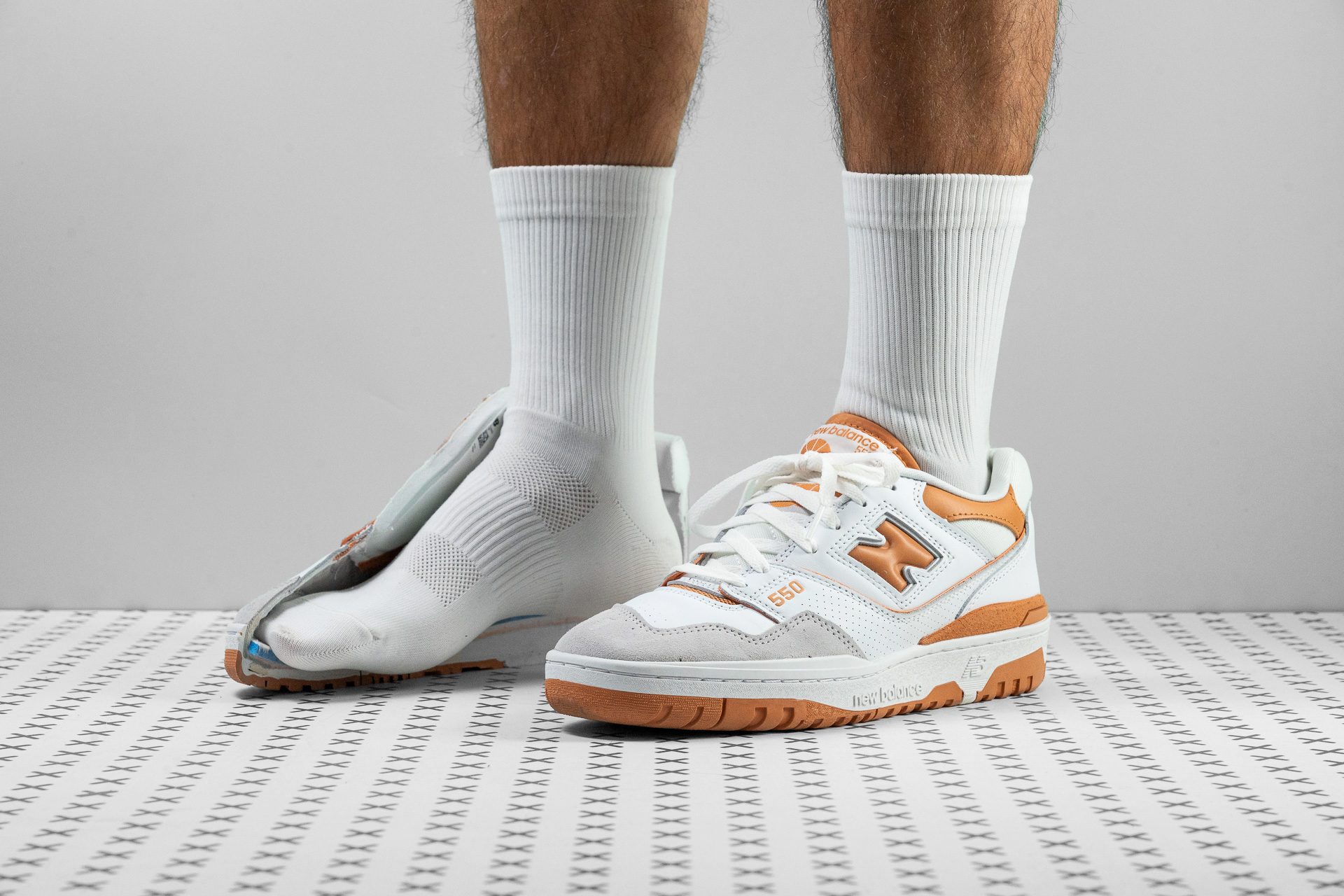Our verdict
- Top pick in best basketball trainers
- Top pick in best New Balance trainers
Pros
- Attention-grabbing throwback look
- Incredibly clean details
- Suitable for various outfits
- Durable, high-quality construction
- No visible wear after several uses
- Easy to clean
- Striking shades
- Reasonably priced
- Awesome grip on wet and dry streets
Cons
- Firm and dull platform
- Insufficient lockdown feel
- Released in a limited quantity
Audience verdict
- Top 10% most popular trainers
Comparison
The most similar trainers compared
+ + Add a shoe | |||||
|---|---|---|---|---|---|
| Audience score | 89 Good! | 96 Superb! | 91 Great! | 95 Superb! | |
| Price | £130 | £110 | £80 | £90 | |
| Style | RetroSporty | Business casualClassicPlatformRetroSporty | ClassicRetroSporty | ClassicRetroSporty | |
| Shock absorption | Moderate | Moderate | - | Low | |
| Energy return | Low | Moderate | - | Low | |
| Traction | High | Moderate | - | High | |
| Breathability | Warm | Moderate | Warm | Breathable | |
| Weight lab | 15.9 oz / 452g | 16.8 oz / 476g | 11.4 oz / 323g | 14.9 oz / 422g | |
| Size | True to size | True to size | True to size | True to size | |
| Midsole softness | Firm | Balanced | Firm | Firm | |
| Material | Cup SoleLeather | Cup SoleLeather | Leather | LeatherSuede | |
| Season | SpringFall | SpringFall | SpringFall | SpringFall | |
| Inspired from | Basketball | Basketball | Running | Basketball | |
| Width / fit | Medium | Narrow | Medium | Wide | |
| Toebox width | Medium | Narrow | Narrow | Medium | |
| Leather/suede quality | Real leather | Real leather | Real leather | Real leather | |
| Toebox durability | Decent | Decent | Decent | Decent | |
| Heel padding durability | Decent | Bad | Bad | Decent | |
| Outsole durability | Decent | Bad | Good | Decent | |
| Heel stack lab | 33.7 mm | 36.7 mm | 35.7 mm | 24.6 mm | |
| Stiffness | Stiff | Stiff | Stiff | Moderate | |
| Tongue padding | Average | Average | Average | Thick | |
| Drop lab | 15.7 mm | 16.6 mm | 13.6 mm | 10.1 mm | |
| Forefoot | 18.0 mm | 20.1 mm | 22.1 mm | 14.5 mm | |
| Removable insole | ✓ | ✓ | ✓ | ✓ | |
| Heel tab | None | None | None | None | |
| Torsional rigidity | Moderate | Stiff | Moderate | Moderate | |
| Heel counter stiffness | Stiff | Stiff | Stiff | Stiff | |
| Closure | Laces | Laces | Laces | Laces | |
| Top | Low top | Low top | Low top | Low top | |
| Ranking | #96 Bottom 20% | #4 Top 4% | #58 Top 48% | #8 Top 7% | |
| Popularity | #11 Top 10% | #6 Top 5% | #79 Bottom 34% | #7 Top 6% |
Who should buy
We recommend the New Balance 550 as a great choice for those who:
- enjoy wearing throwback-styled trainers with modern comfort
- are looking for an affordable New Balance model to add to your rotation
- prefer kicks that are easy to maintain
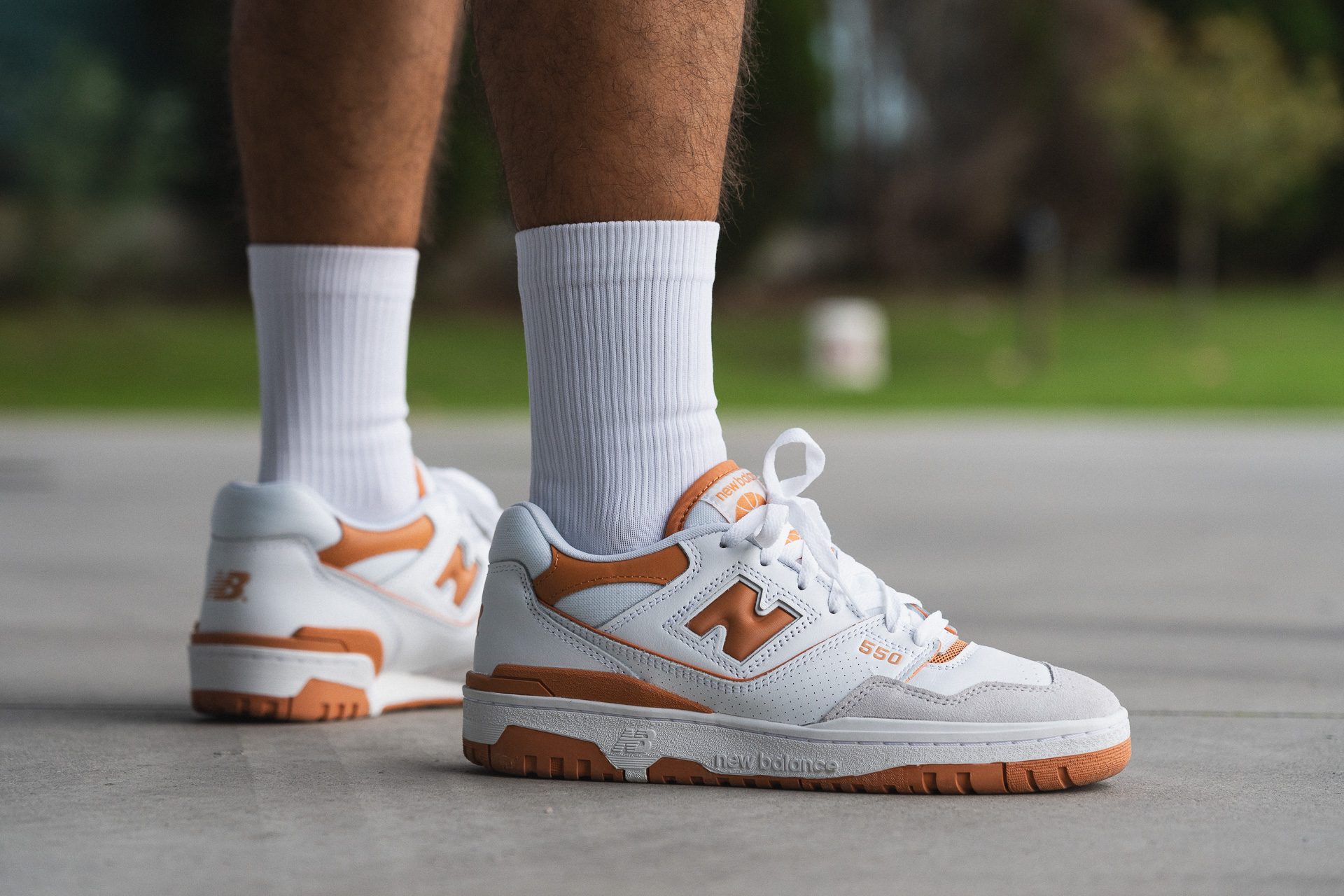
Who should NOT buy
The 550 boasts a rather firm midsole, so those who prefer softer cushioning from their trainers should check out the positively plush New Balance 9060.
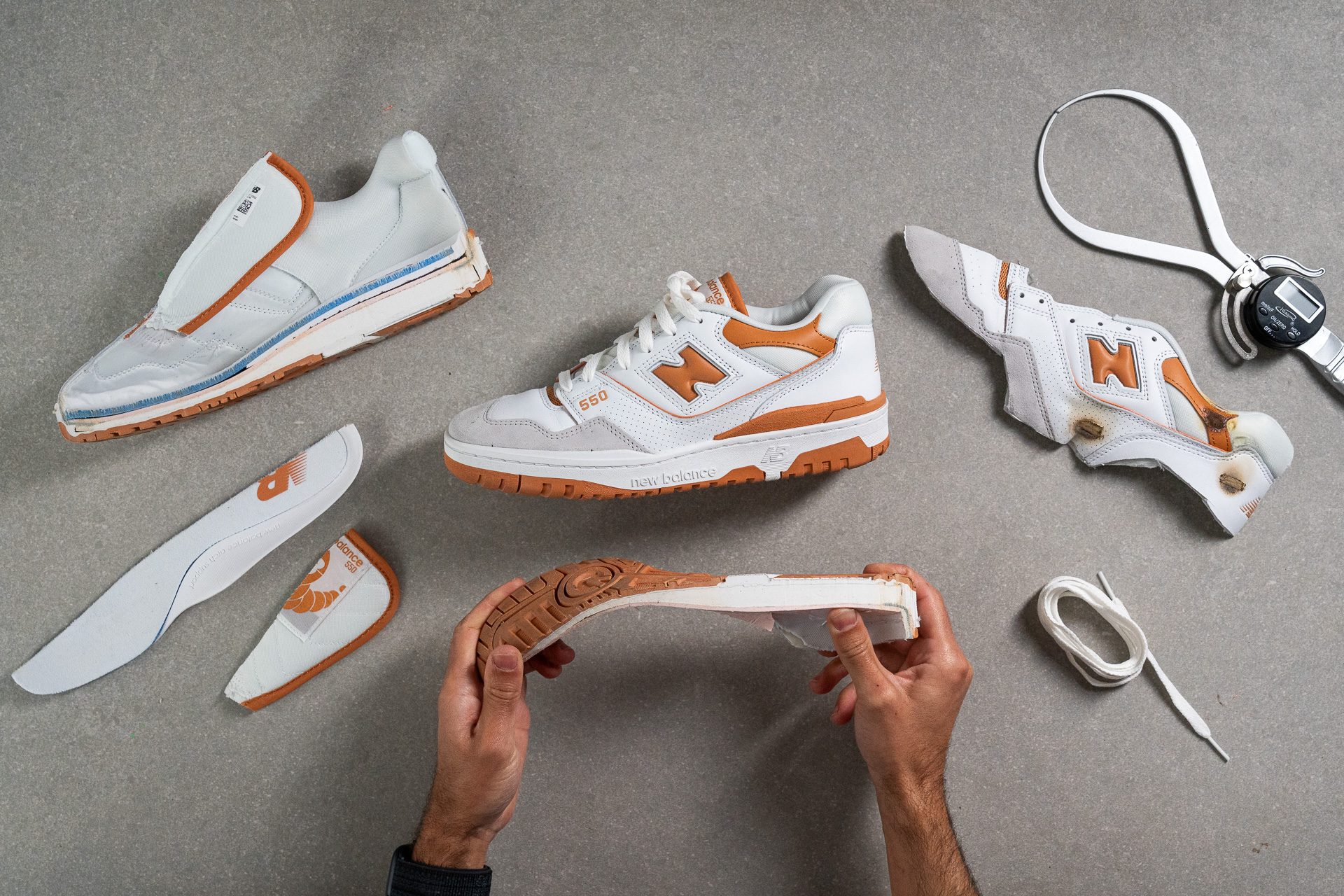
Cushioning
Shock absorption
The NB 550 has a surprisingly decent level of impact protection given its stiff and firm construction.
With a shock absorption measurement of 85 SA, it is actually on par with the category average. Not the best option for all-day wear, but sufficiently comfortable for a few hours of going out and about.
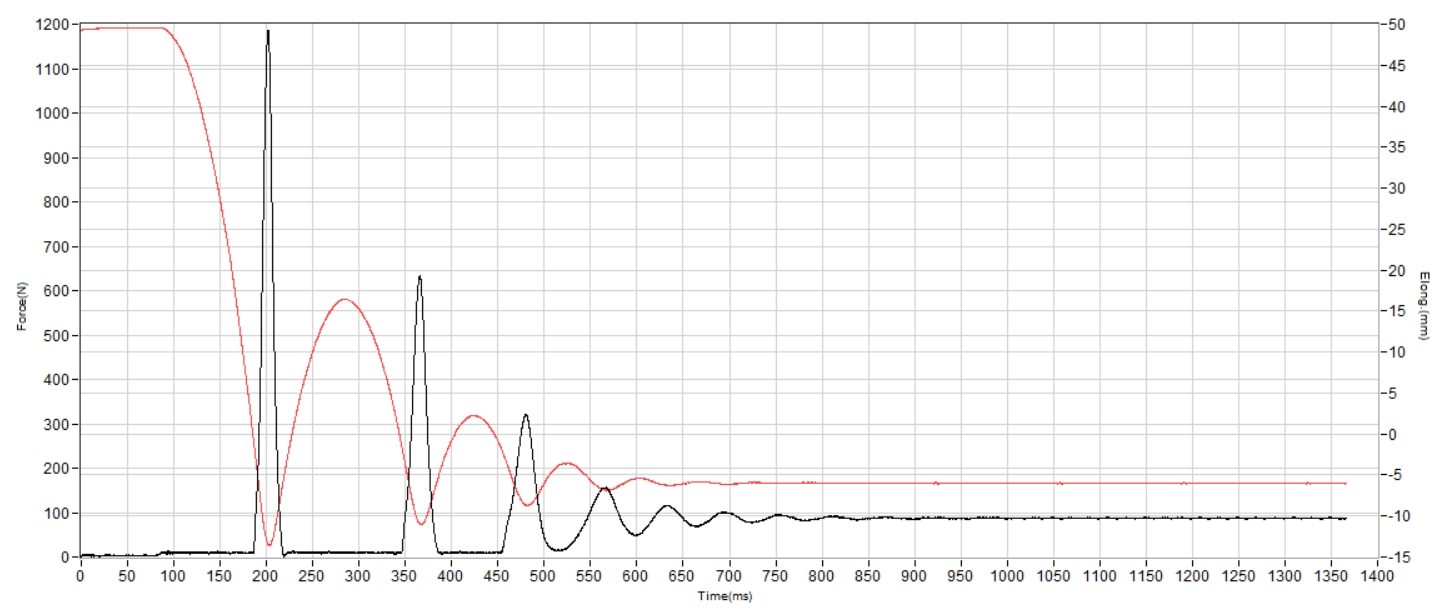
| 550 | 85 SA |
| Average | 89 SA |
Energy return
A flat and static ride is also to be expected from a shoe like this. It's got a low-rebound platform with a minimal energy return of 43%. Not a springy one, but very stable in return.
| 550 | 43.4% |
| Average | 50.2% |
Heel stack
Using our calliper, we measured the 550’s stack to be 33.7 mm thick at the heel.
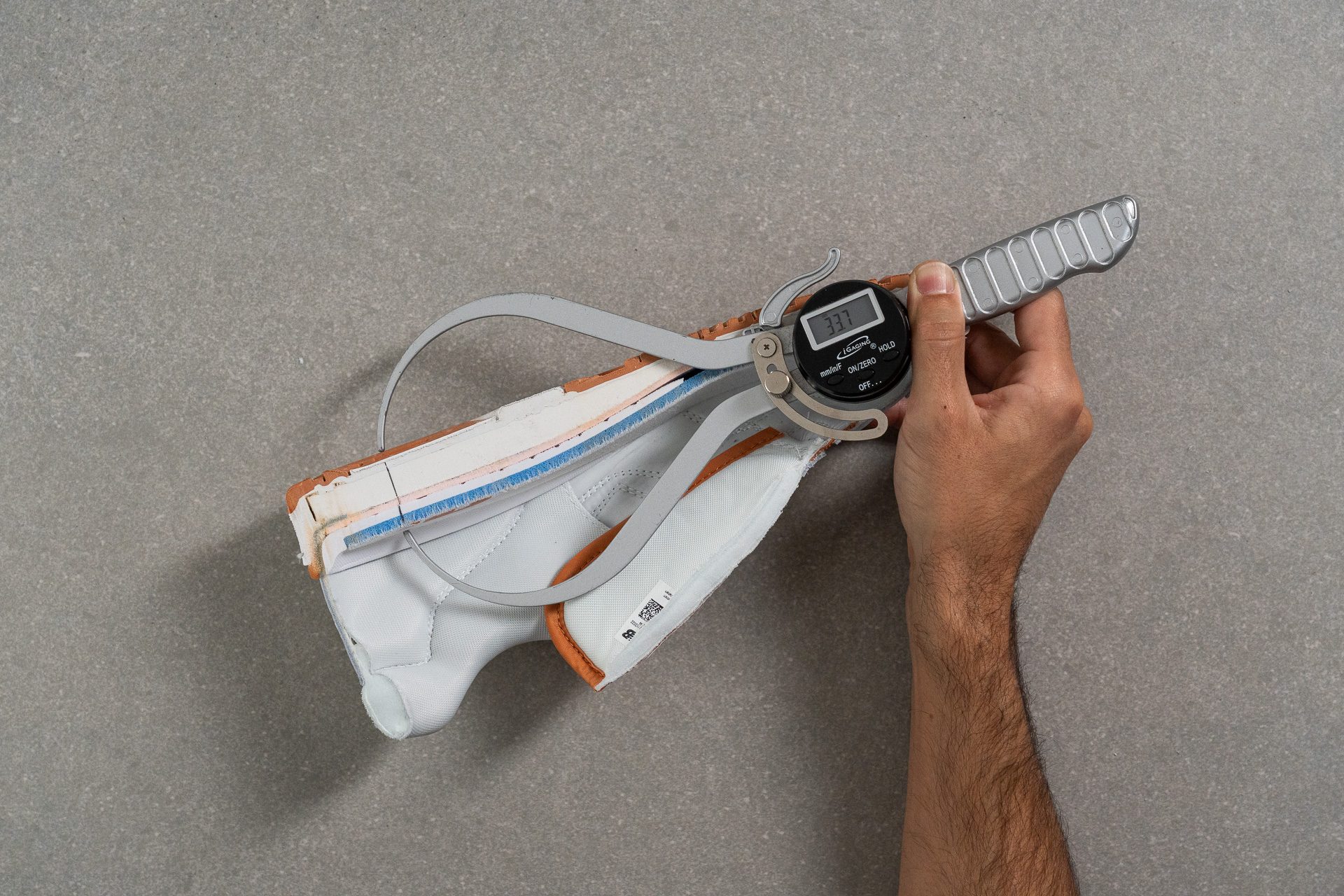
This is slightly higher than our current lab average and means that the 550 effectively dampens our landings with a ride that’s comfy as well as supportive.
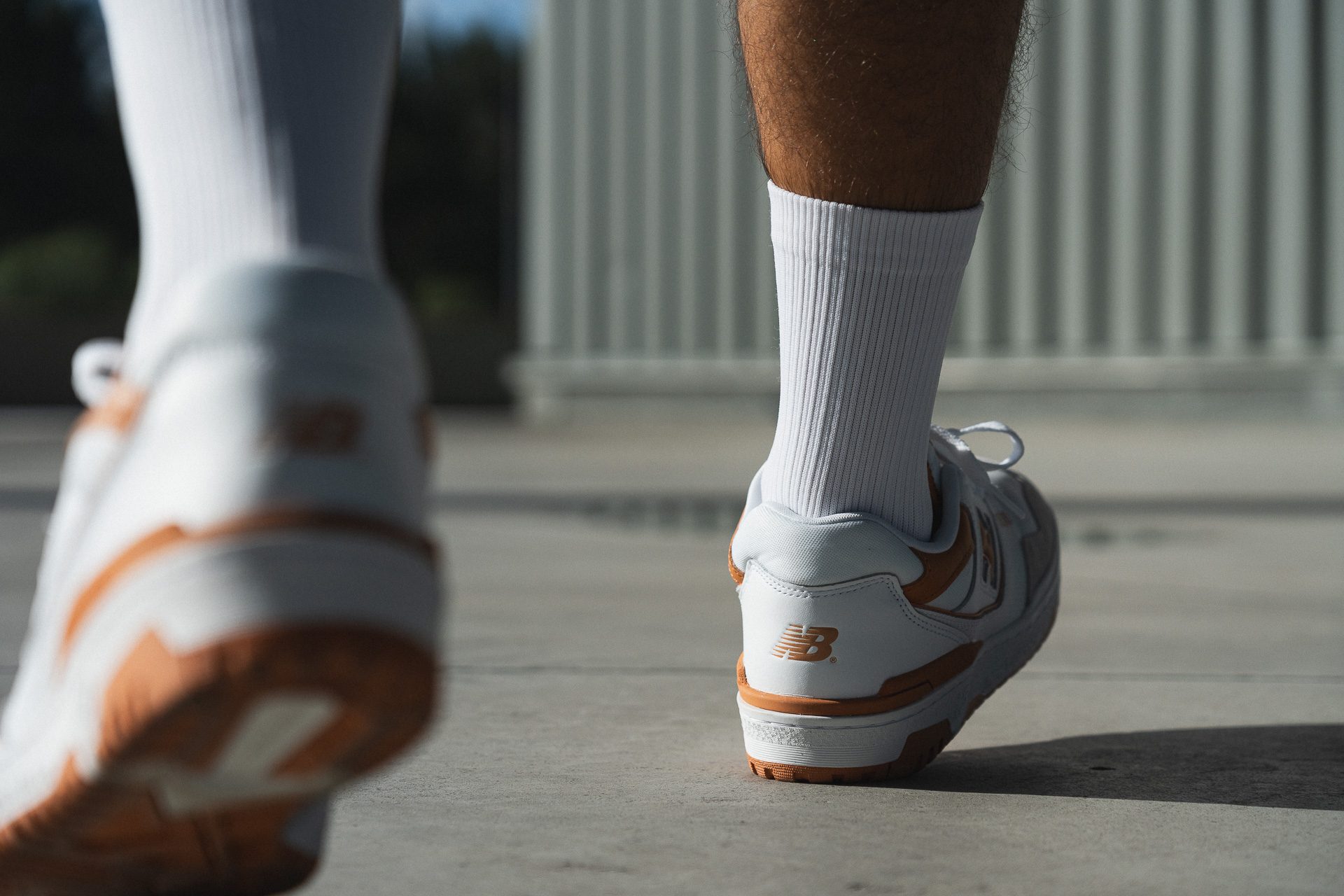
| 550 | 33.7 mm |
| Average | 30.7 mm |
Forefoot stack
The 550’s stack is on par with our current lab average at 18.7 mm thick at the forefoot. According to our calliper measurements.
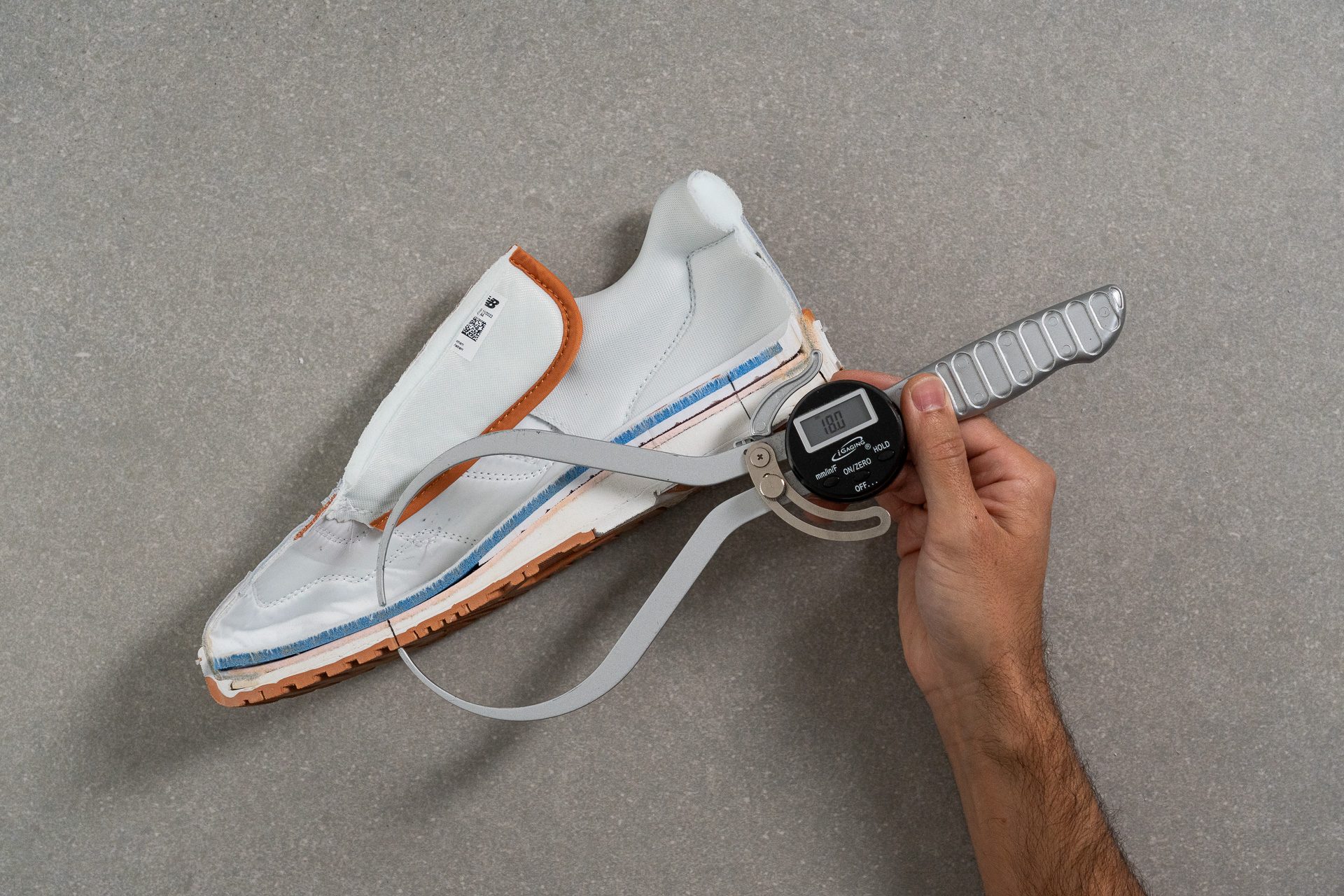
This gives us a good sense of the surface below which serves to keep us feeling grounded and nimble despite the relatively high heel.
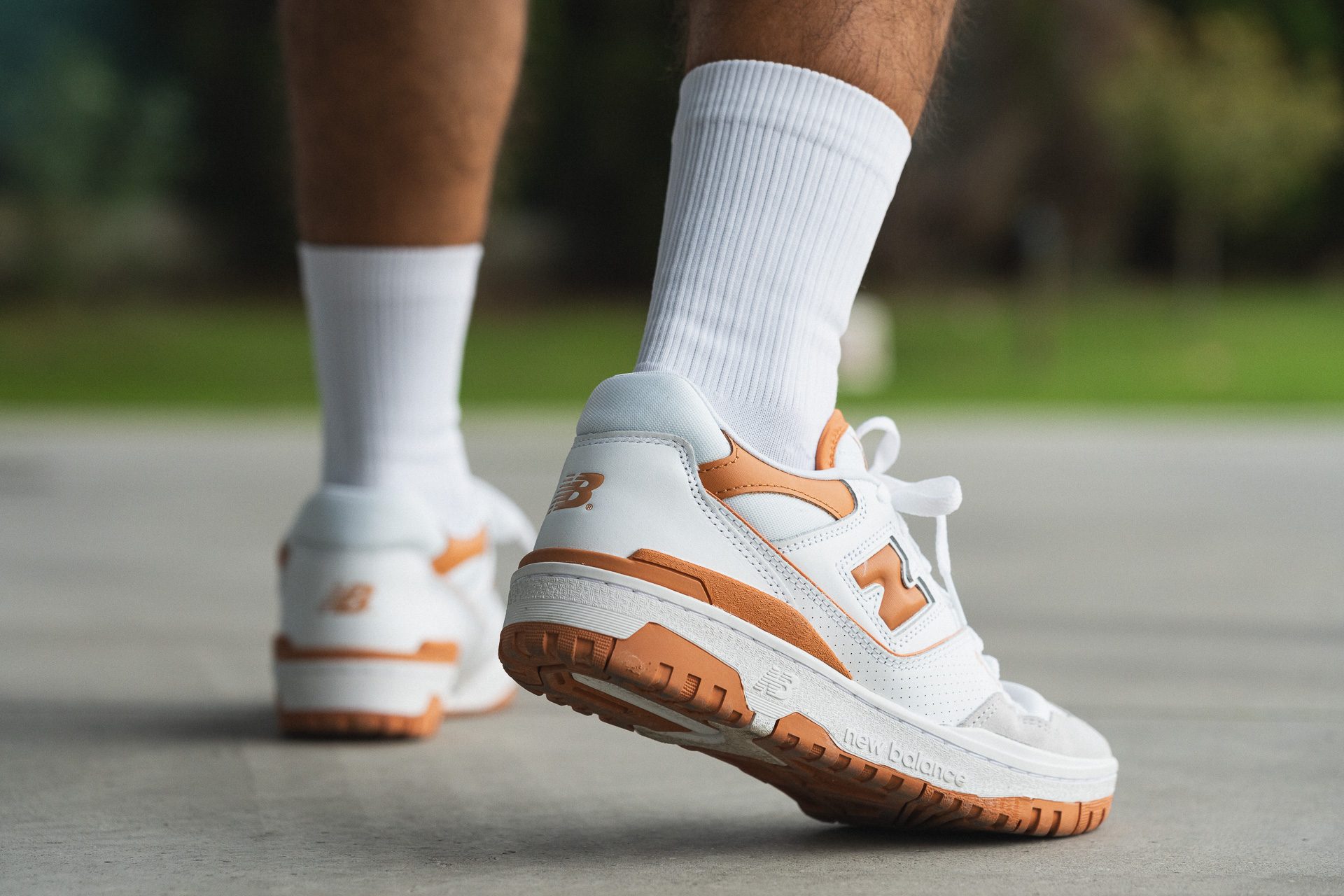
| 550 | 18.0 mm |
| Average | 19.5 mm |
Drop
The difference in our stack measurements leaves the 550 with a heel drop of 15.7 mm. This steeper-than-average offset makes the shoe a good choice for those who prefer the feeling of an elevated heel from their sneakers.
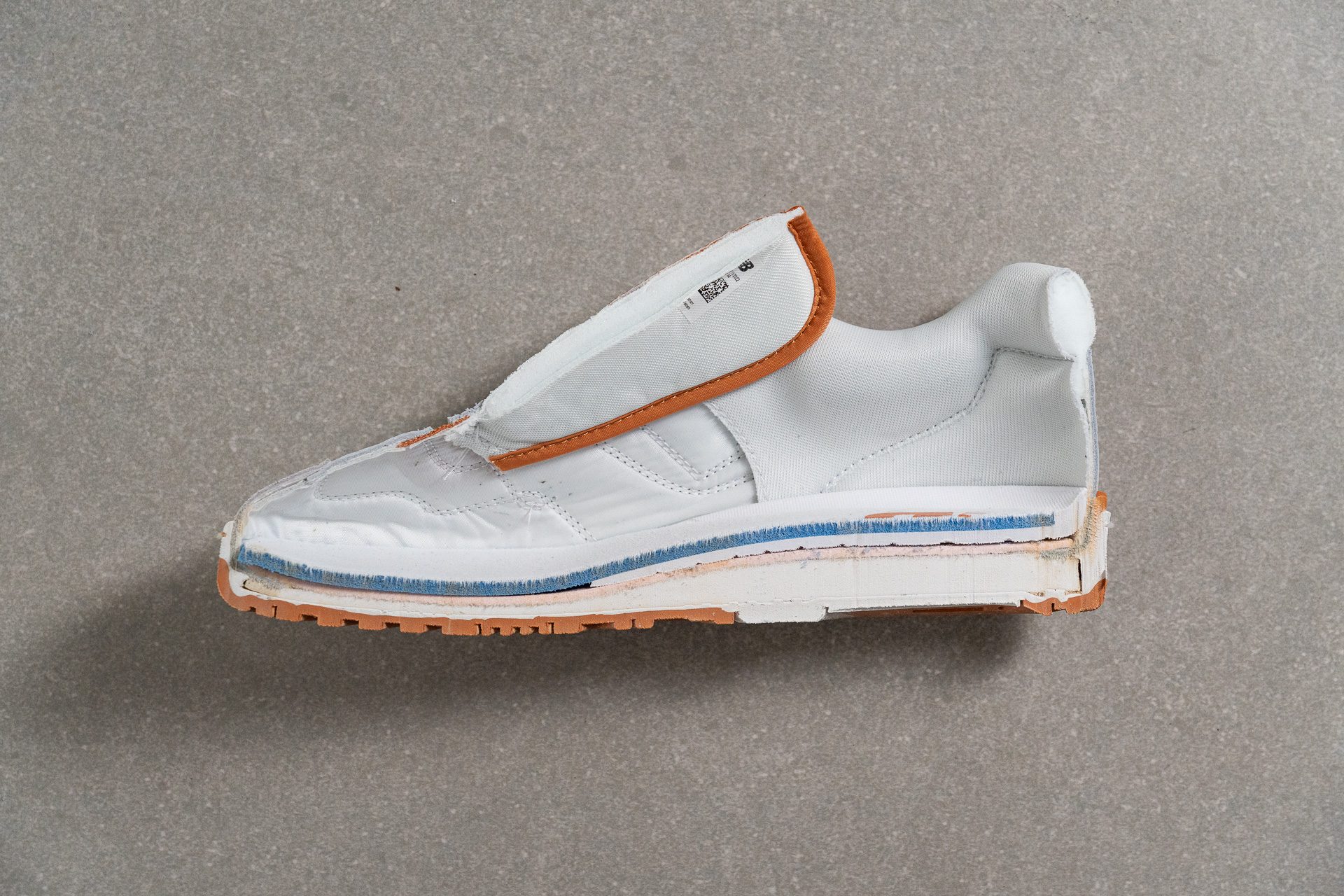
| 550 | 15.7 mm |
| Average | 11.2 mm |
Midsole softness
We pressed our durometer against the 550’s midsole and got a rather firm reading of 34.5 HA.
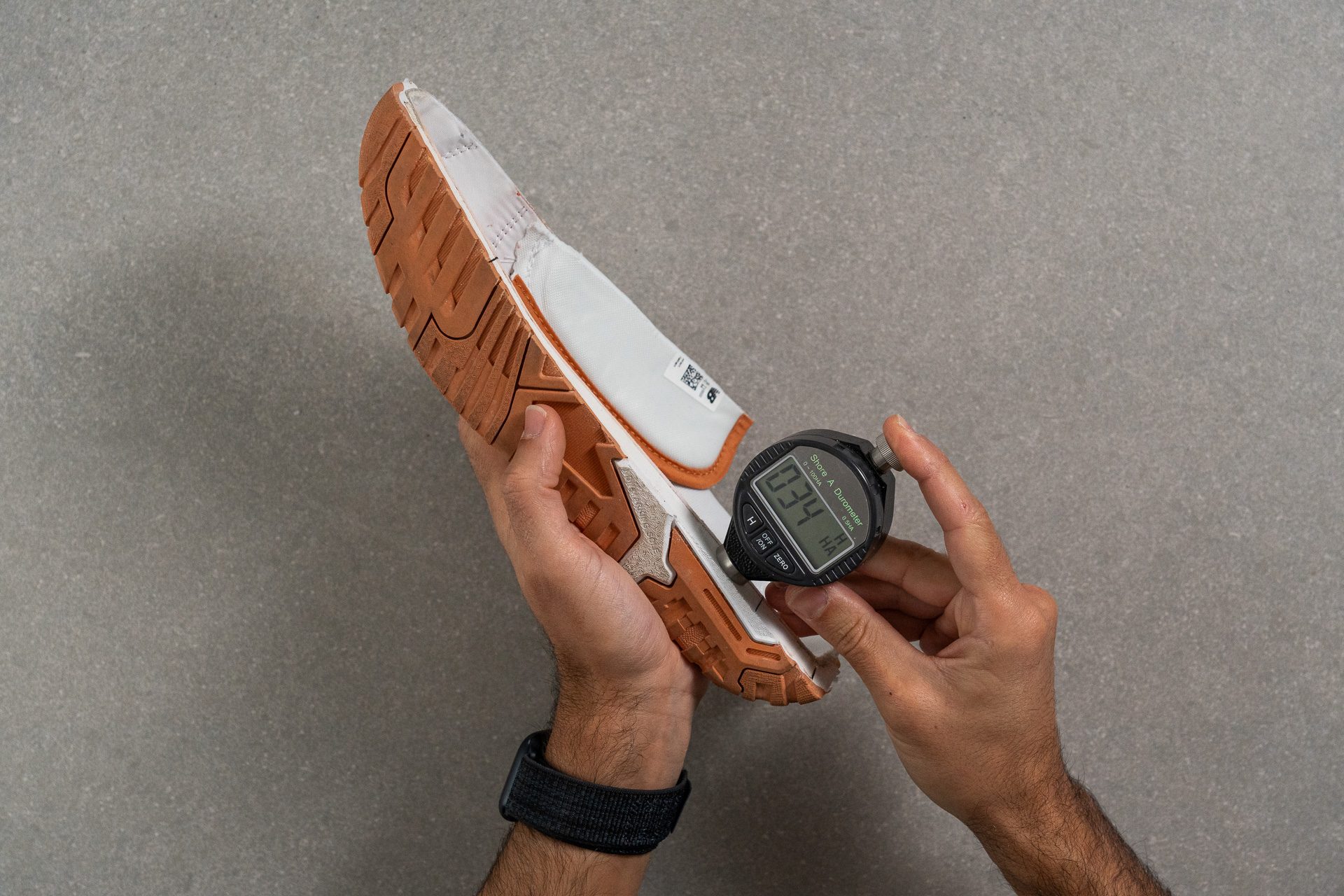
It still feels well-cushioned enough for day-to-day purposes, thanks in part to the relatively robust heel stack.
| 550 | 34.5 HA |
| Average | 28.6 HA |
Size and fit
Size
New Balance 550 fits true to size (389 votes).
Internal length
| 550 | 268.4 mm |
| Average | 272.3 mm |
Width / Fit
Even though the 550 looks different from a typical New Balance dad shoe, it fits just like one. Our medium-width feet didn't experience any pressure points or dead space.
And when we measured the gel mould of the shoe's interior with a digital calliper, we found that it has a standard width of 91.4 mm in the widest part (between the pinkie and the big toe).
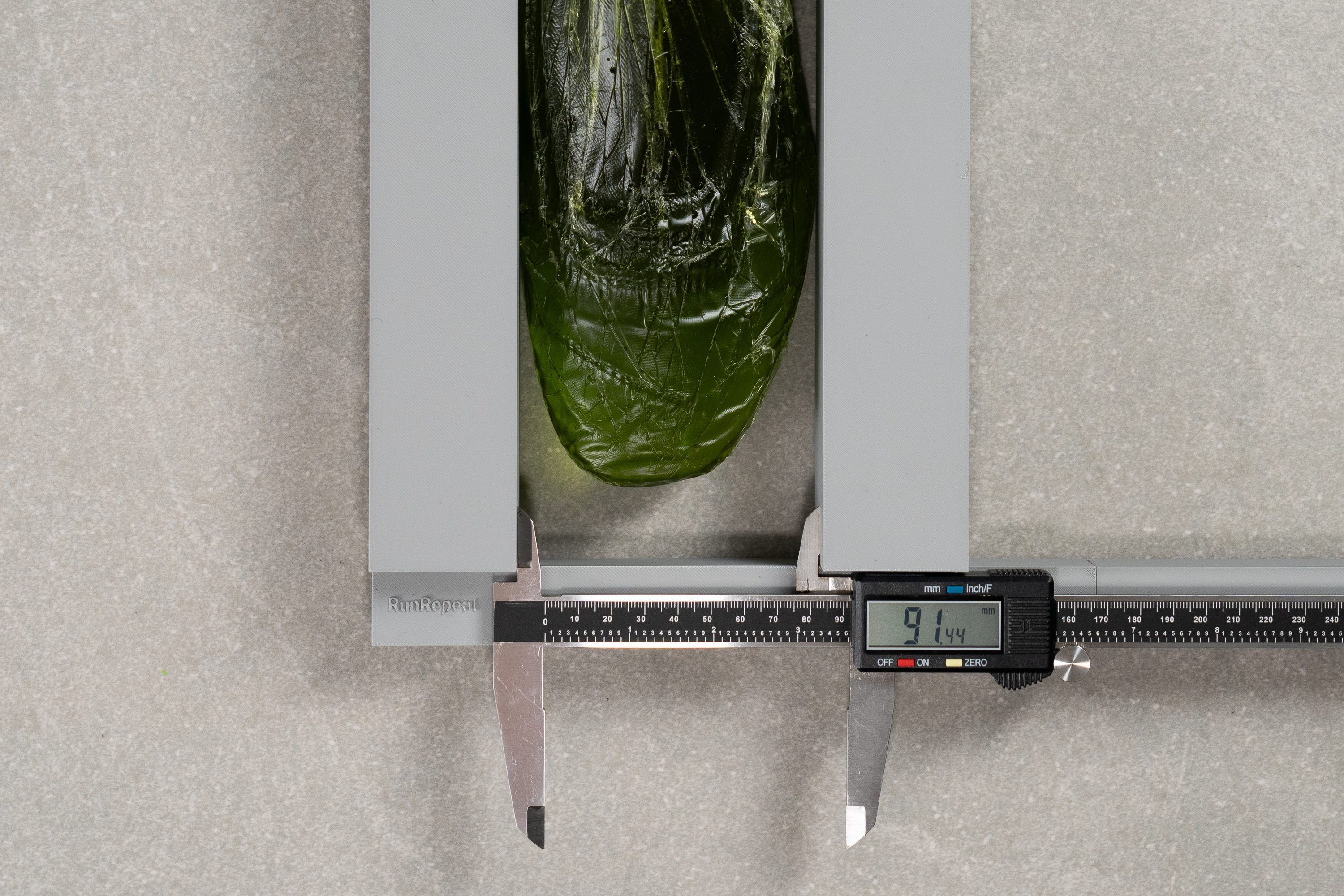
| 550 | 91.4 mm |
| Average | 92.5 mm |
Toebox width
We also found that the 550 has a moderate taper angle and doesn't deviate from the average width near the big toe.
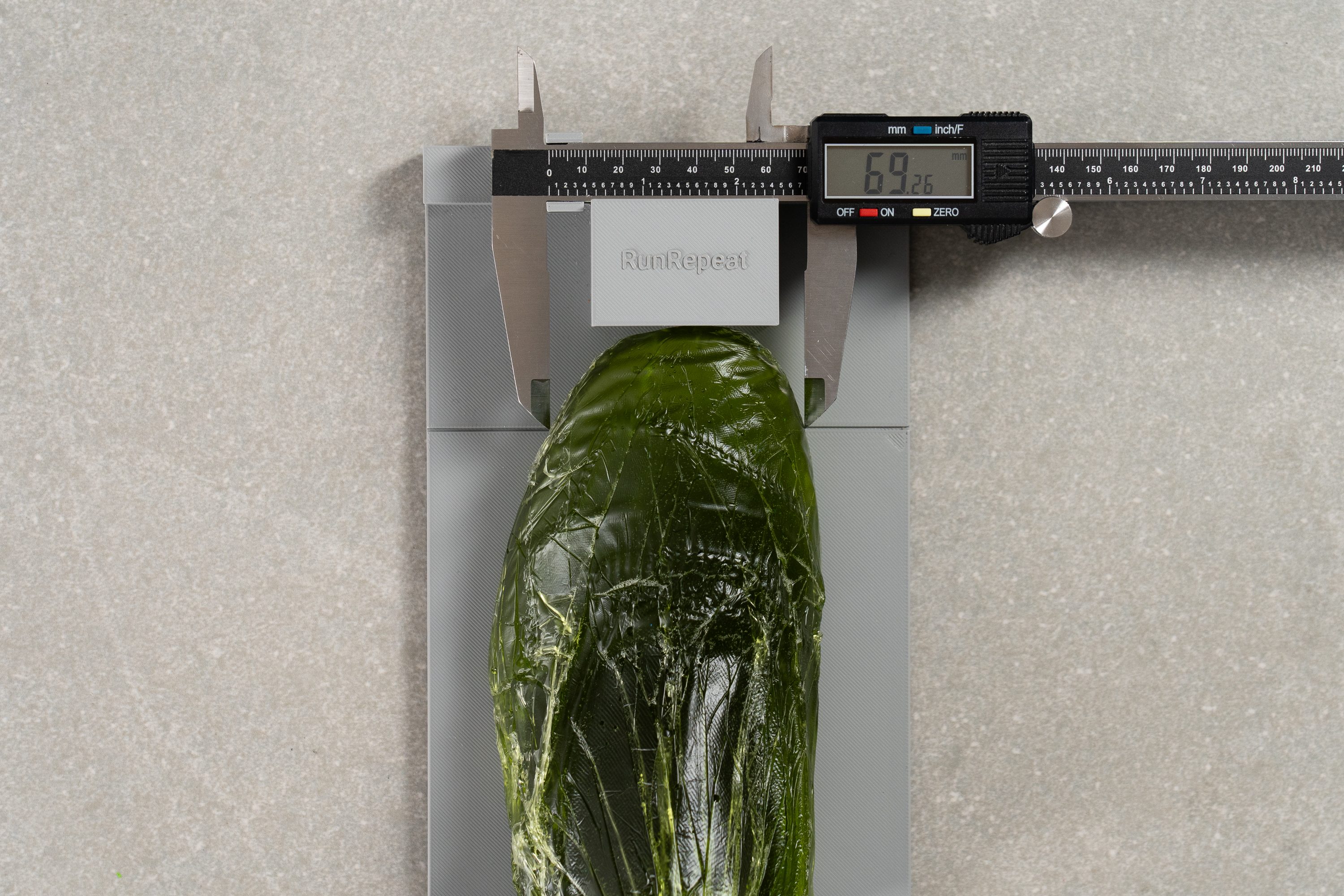
| 550 | 69.2 mm |
| Average | 68.9 mm |
Toebox height
Even though the shoe's toebox height is a little lower than average at 25.8 mm, it didn't put any pressure on top of our toes.
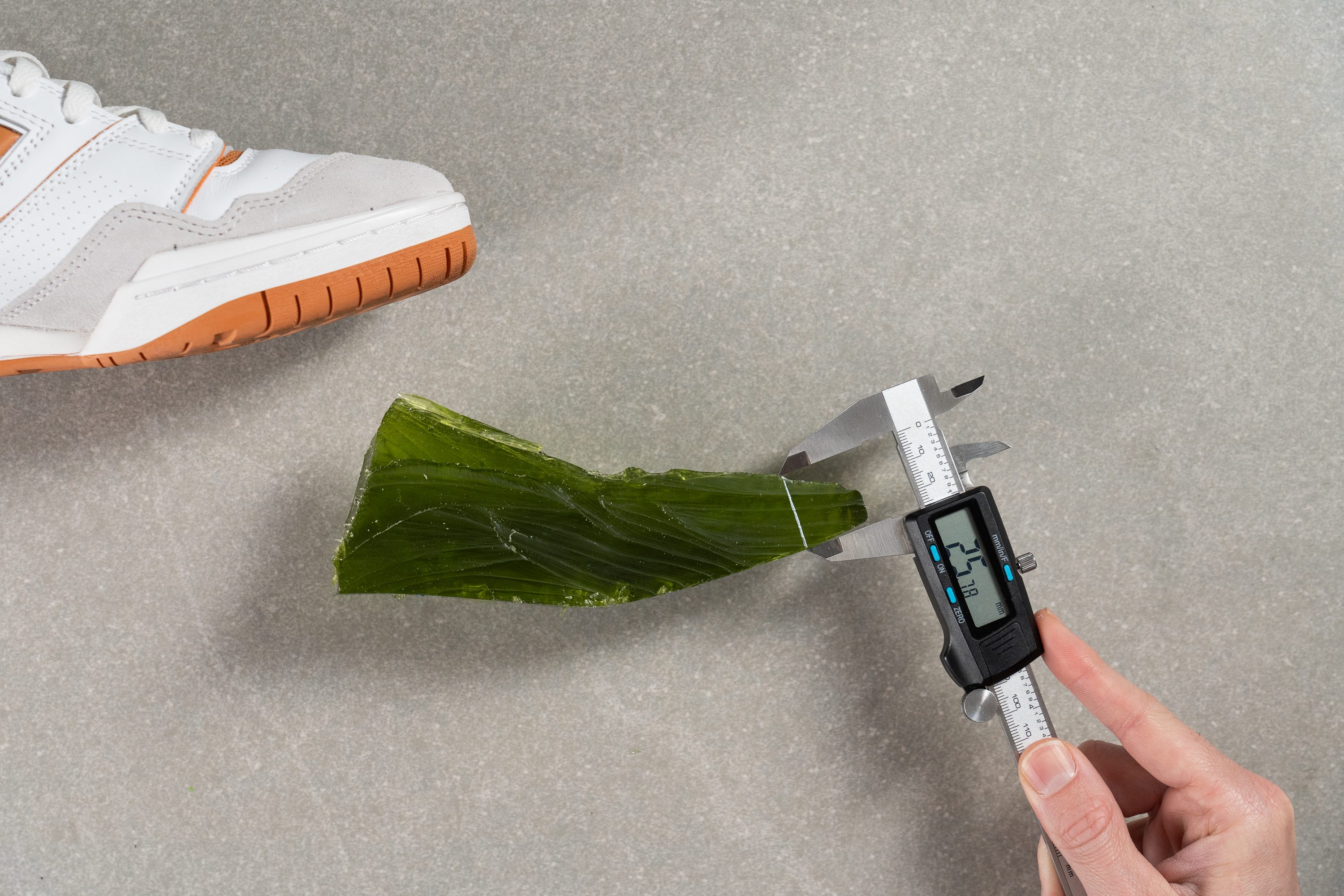
| 550 | 25.8 mm |
| Average | 27.8 mm |
Traction / Grip
We found the toebox to be narrower than our current lab average, measuring only 95.8 mm wide at its widest point. This means that the 550 won’t feel very accommodating for those with broad feet.

Traction test
New Balance doesn't specify the type of rubber it uses for the 550 but our lab tests showed that it's a grippy one!
Stomping the shoe's heel against wet concrete at a 7-degree angle, our machine mimicked a person's heel strike and recorded a high friction score of 0.50. This above-average coefficient implies that you can walk on dry and wet surfaces confidently in this NB shoe.
| 550 | 0.50 |
| Average | 0.43 |
Outsole design
The 550 comes with a vintage cupsole construction, a blocky tread pattern, and a forefoot pivot point all of which give off 80s/90s basketball shoe vibes.
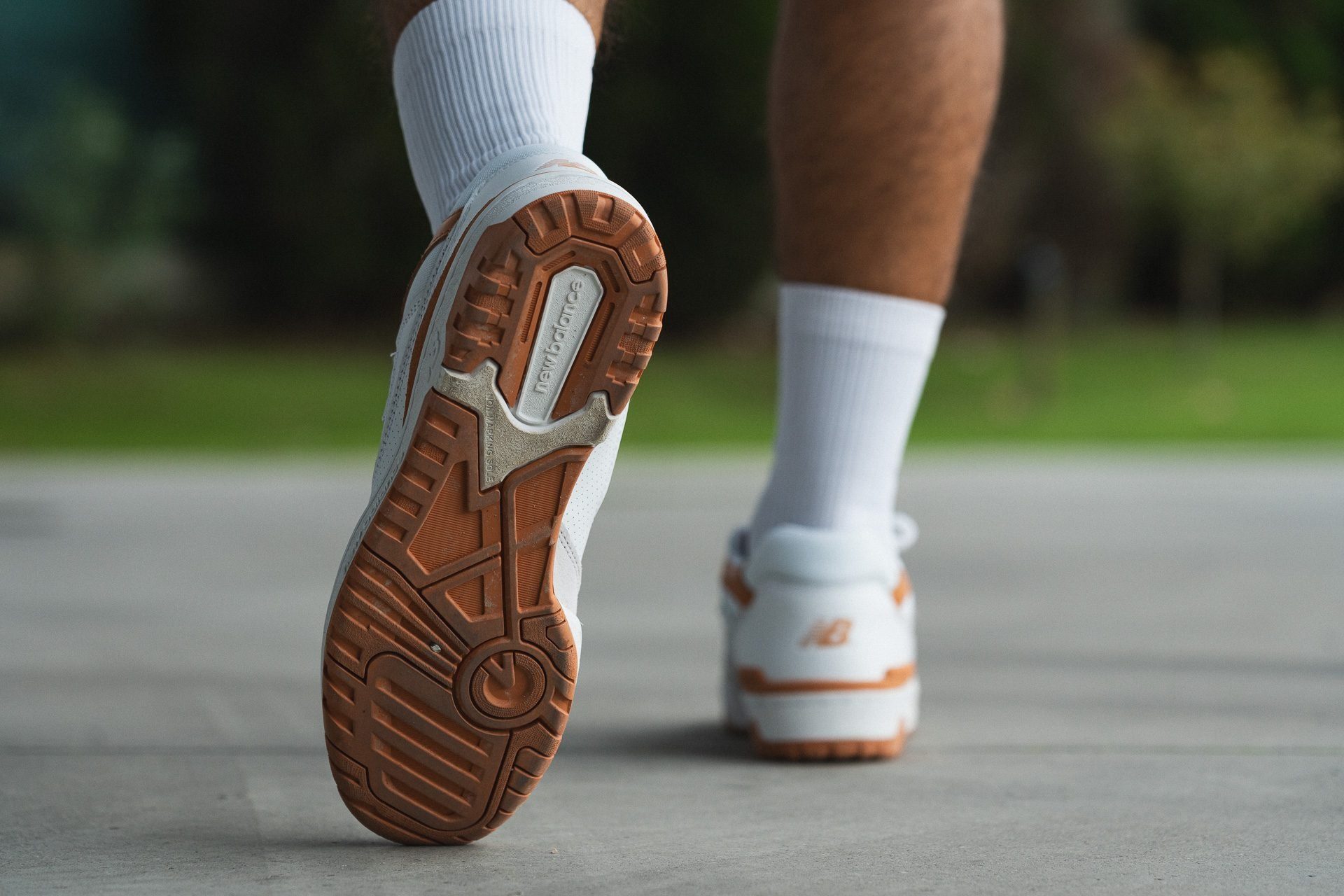
Flexibility / Stiffness
Having secured the 550 to our shoe flexing tester, we found that it required a force of 17.9N to bend by 30 degrees. This means that the 550 tales about 30% more force to bend and it is less flexible than the average sneaker. We could clearly feel that the shoe was resistant to the natural flexion of our foot during the wear test.
That being said, it's not so stiff that we felt uncomfortable in the shoe, but rather contributes further to how stable the shoe felt during our tests.
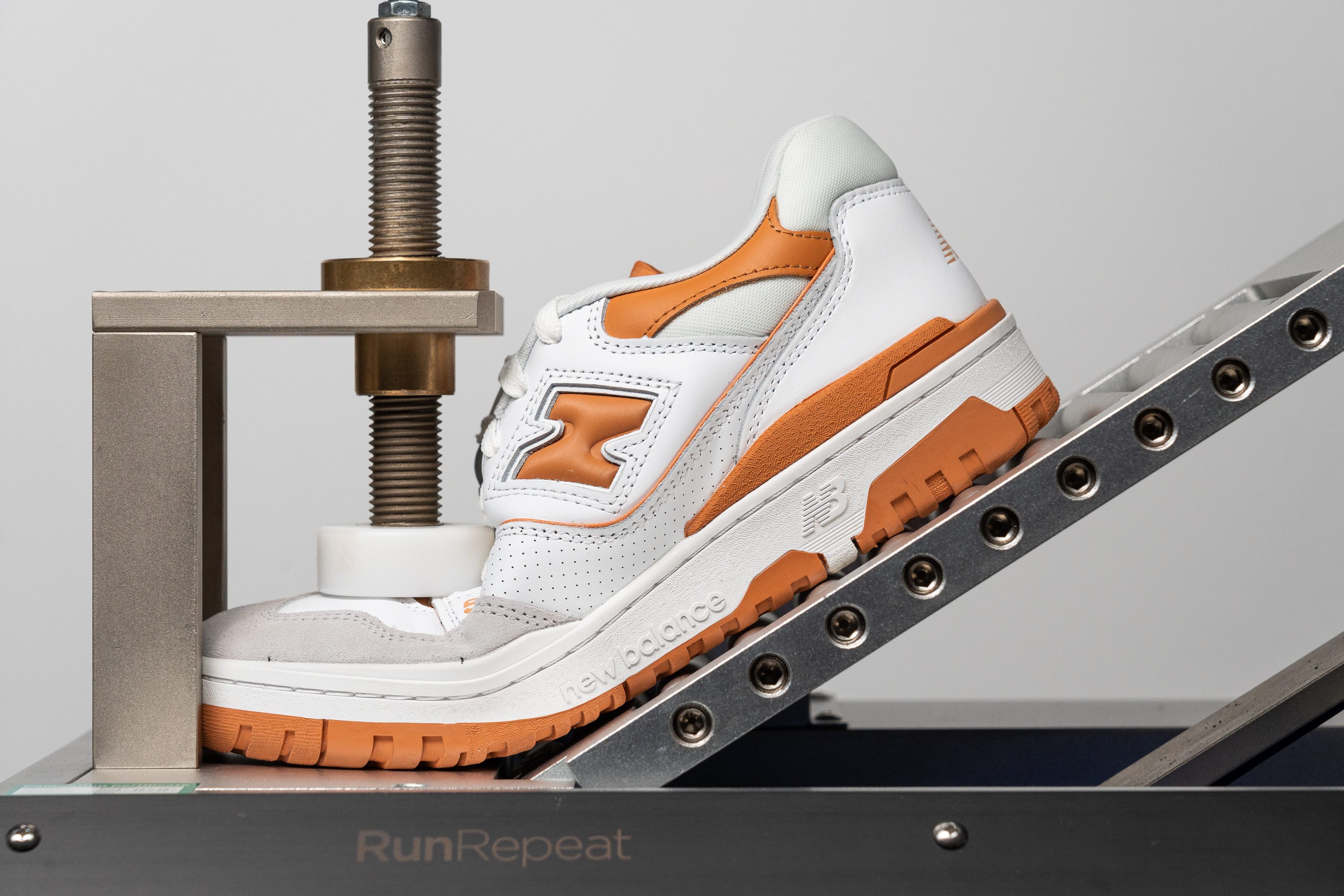
| 550 | 17.9N |
| Average | 13.3N |
Weight
With its leather upper and all that rubber on the outsole, it’s no wonder that the 550 is heavier than the average sneaker at 16 oz (452g). However, we wouldn’t go as far as to describe the shoe as burdensome, especially when it comes to normal day-to-day activities.
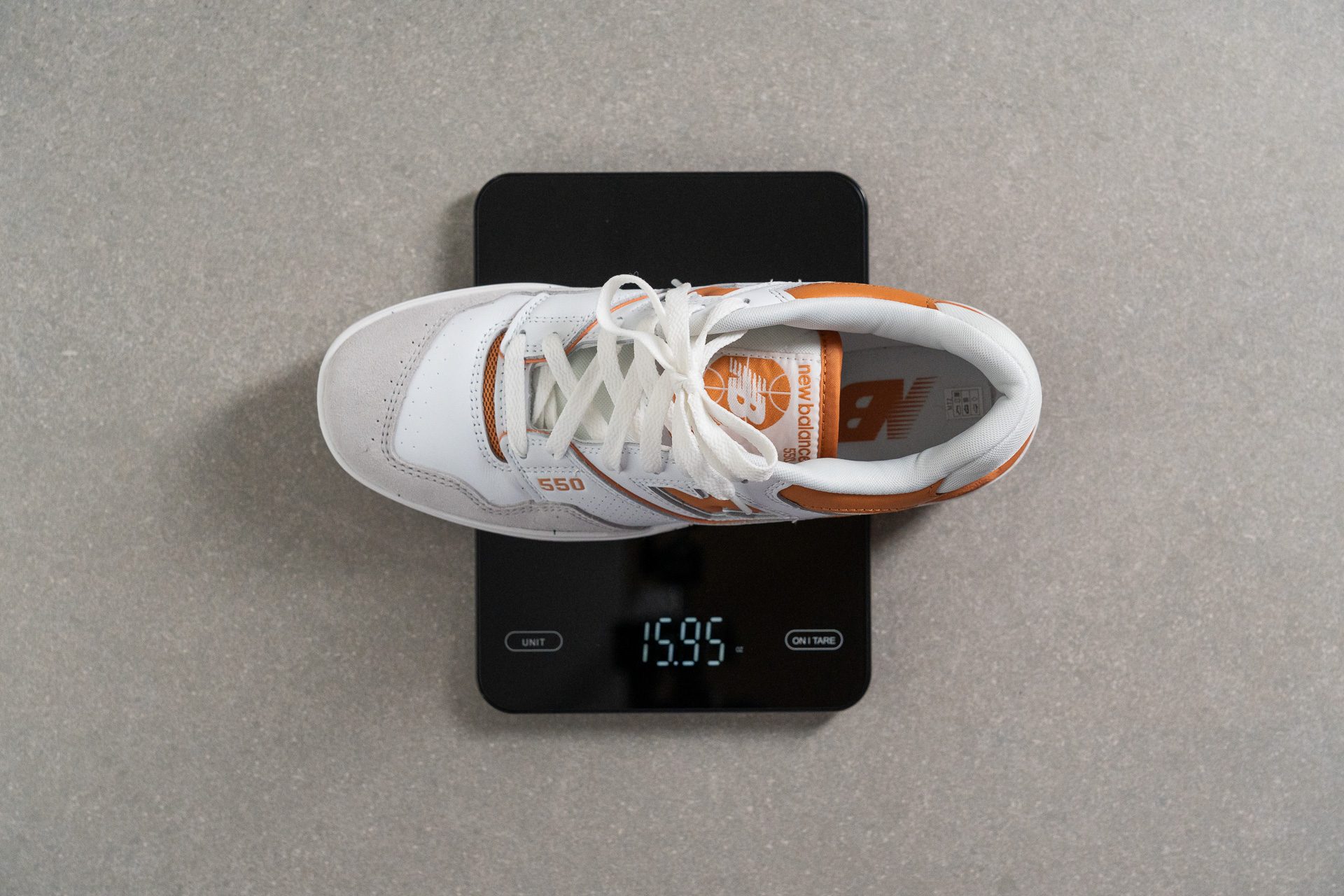
| 550 | 15.9 oz (452g) |
| Average | 13.8 oz (390g) |
Breathability
As is generally the case with leather trainers, the 550 suffers from sub-par airflow. Our smoke test helps to give a visual idea of the shoe’s poor airflow as we can see that smoke is mainly able to escape in thin wisps through the shoe’s perforated tongue. We therefore give the 550 a breathability score of 2 out of 5, which means that it will certainly feel toasty during the warm summer months.
Despite appearing to sport lots of micro-perforations along the shoe’s side panel, inspecting a backlit cross-section of the upper reveals that the only part of the 550 that allows light to shine through is the non-leather tongue. This further illuminates the shoe’s lacklustre performance in our smoke test.
The narrow strip of mesh that acts as a bridge between solid slabs of leather is a little detail that likely saved this shoe from receiving the lowest breathability score. As we can see from our microscope shots, this section is made up of two layers of mesh braided with lots of gaps that promote at least a minimal amount of airflow through the shoe.
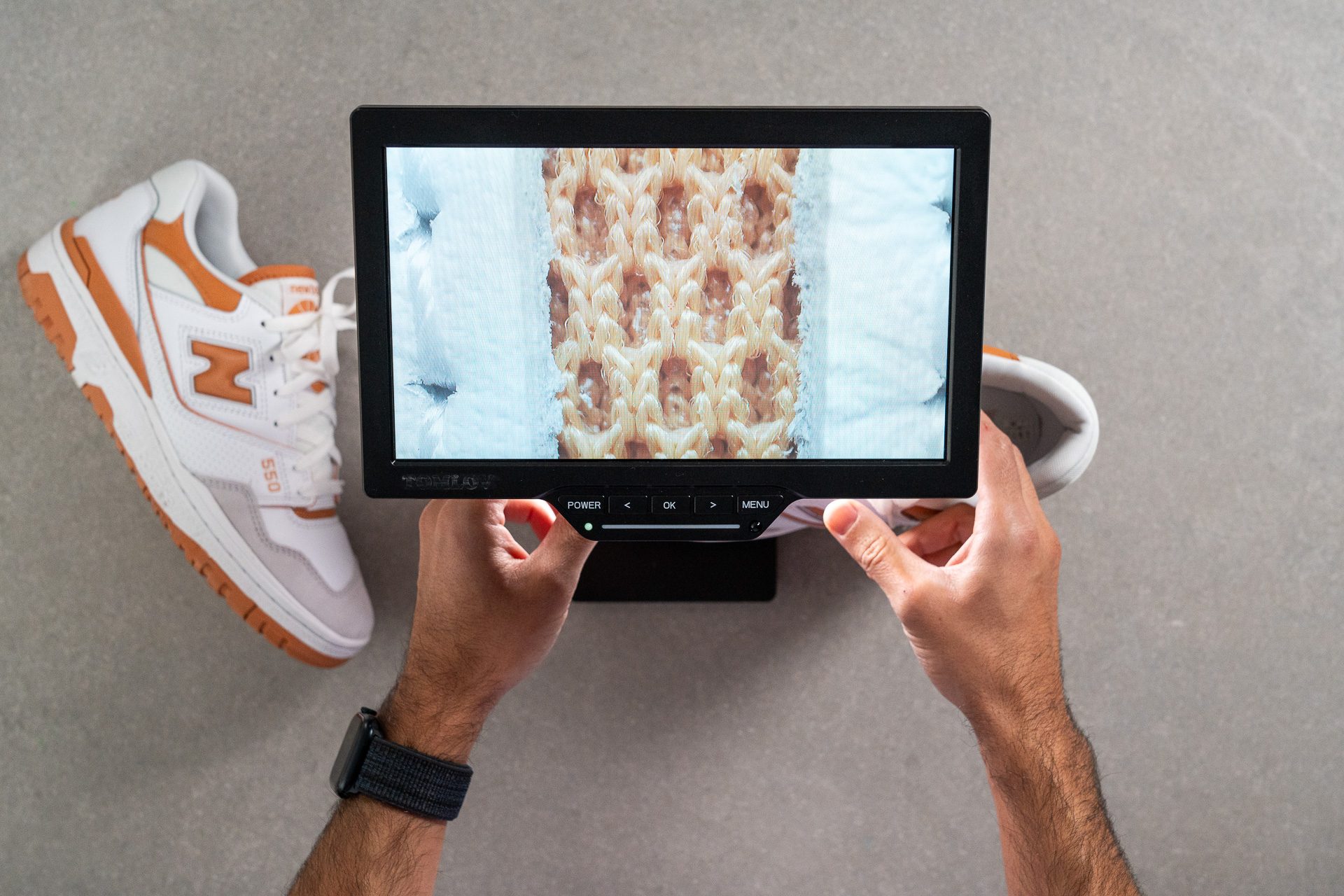
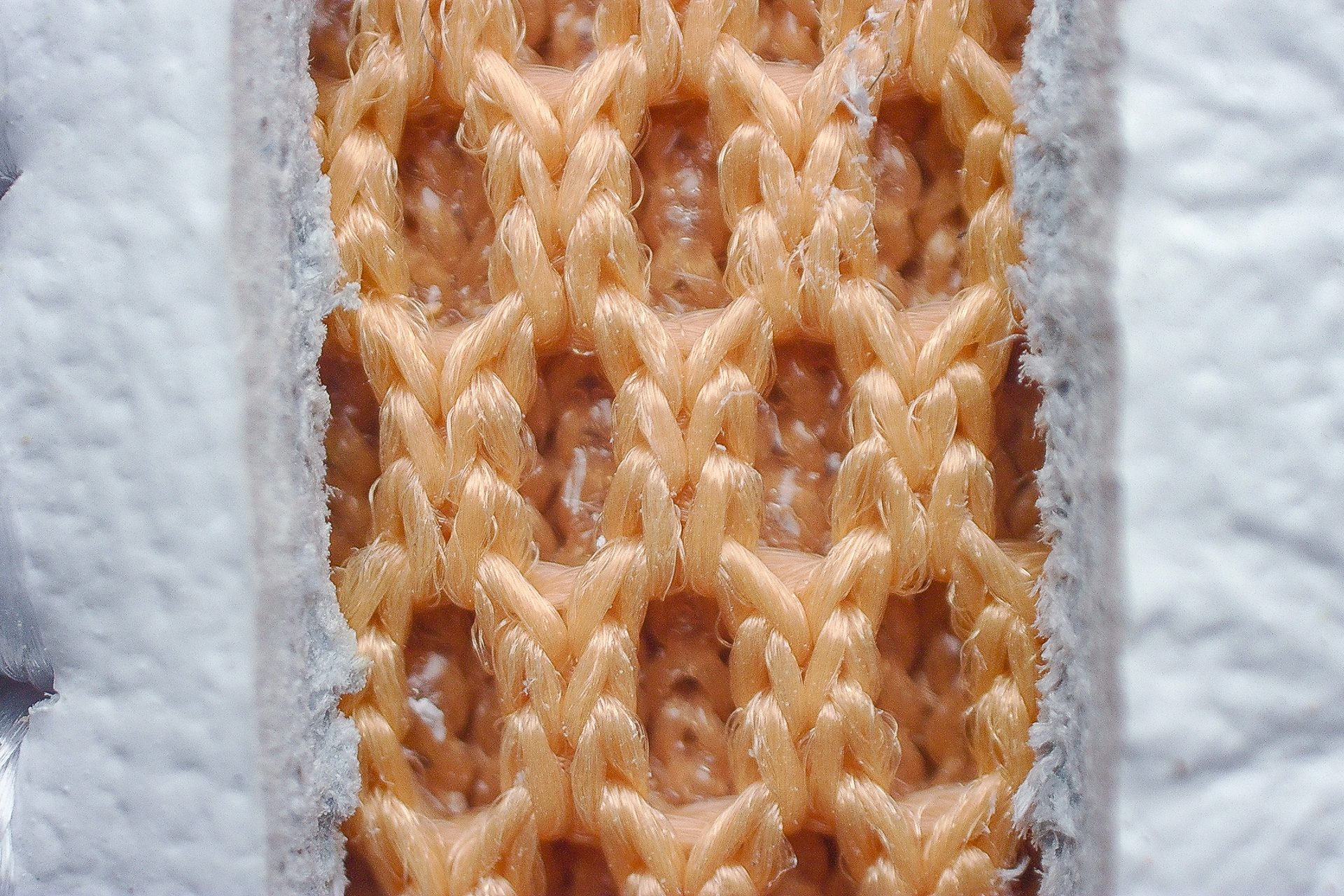
| 550 | 2 |
| Average | 3 |
Stability
Lateral stability test
We felt incredibly well-planted as we shifted our weight from side to side in the 550. This not only makes it a nice and stable kick for strutting about town but also means that we can hit the courts for some pickup games with confidence.
Torsional rigidity
We found the 550 quite difficult to bend and twist in our hands, leading us to give it a torsional rigidity score of 4 out of 5 on our subjective scale. As such, the shoe’s structure works to mitigate any excessive lateral movements that might negatively impact our sense of balance.
| 550 | 4 |
| Average | 3.6 |
Heel counter stiffness
The well-structured nature of the shoe extends to the generously padded heel counter which also put up an above-average level of resistance as we probed and squeezed at it, earning it another 4 out of 5 for heel counter stiffness.
This also helps in preventing our foot from rolling laterally during our stride which further contributes to the 550’s stable underfoot sensation. However, it doesn’t provide a solid enough rearfoot lockdown to prevent our heel from sliding up and down as we move around.
| 550 | 4 |
| Average | 3.2 |
Midsole width - forefoot
At only 102 mm wide according to our caliper, the 550’s midsole isn’t as broad as the average sneaker at the forefoot. However, we didn’t find that this negatively impacted the shoe’s stability during our tests, especially with the forefoot being so close to the ground. On the other hand, this slim profile does make the shoe feel rather nimble despite looking somewhat clunky.
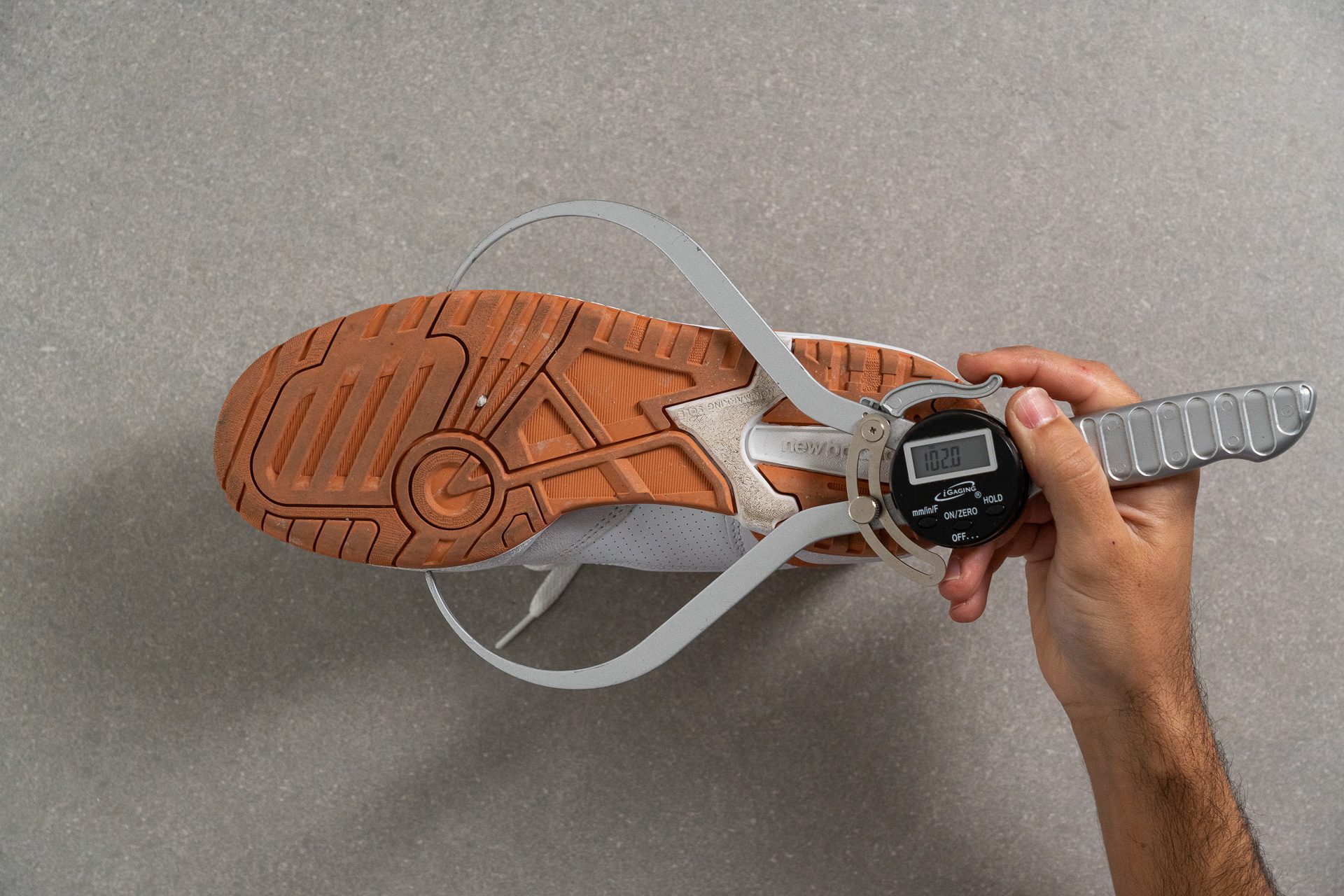
| 550 | 102.0 mm |
| Average | 108.9 mm |
Midsole width - heel
At the heel, the midsole is closer to but still shy of our current lab average at 78.1 mm wide based on our caliper measurements.
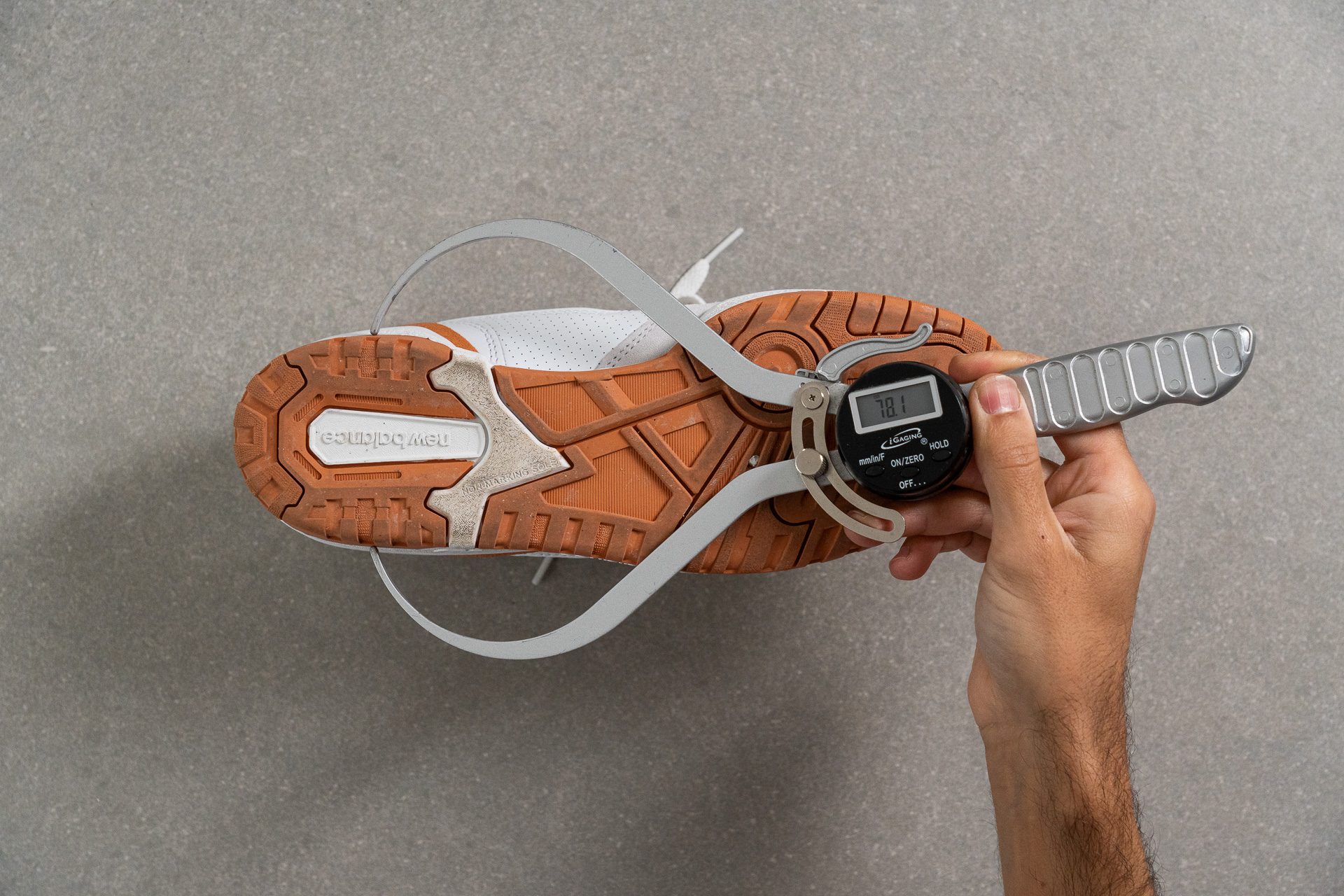
| 550 | 78.1 mm |
| Average | 84.0 mm |
Durability
Leather/Suede quality
By searing the various sections and overlays that make up the 550’s upper with our blowtorch and scratching off the scorched remains, we determined that they are all made of genuine leather. This absence of synthetic materials is truly remarkable for a shoe at this extremely fair price point.
| 550 | Real leather |
Toebox durability
Shoes with leather uppers tend to fare pretty well in our durability tests, and the 550 is no exception.
Despite quickly throwing up a flurry of material at the onset of the test, we found that our Dremel had done little more than smooth out the area at the point of contact with our abrasive element, leaving only a minor scuff on the toebox after four seconds. This above-average performance earns the 550 a toebox durability score of 4 out of 5.
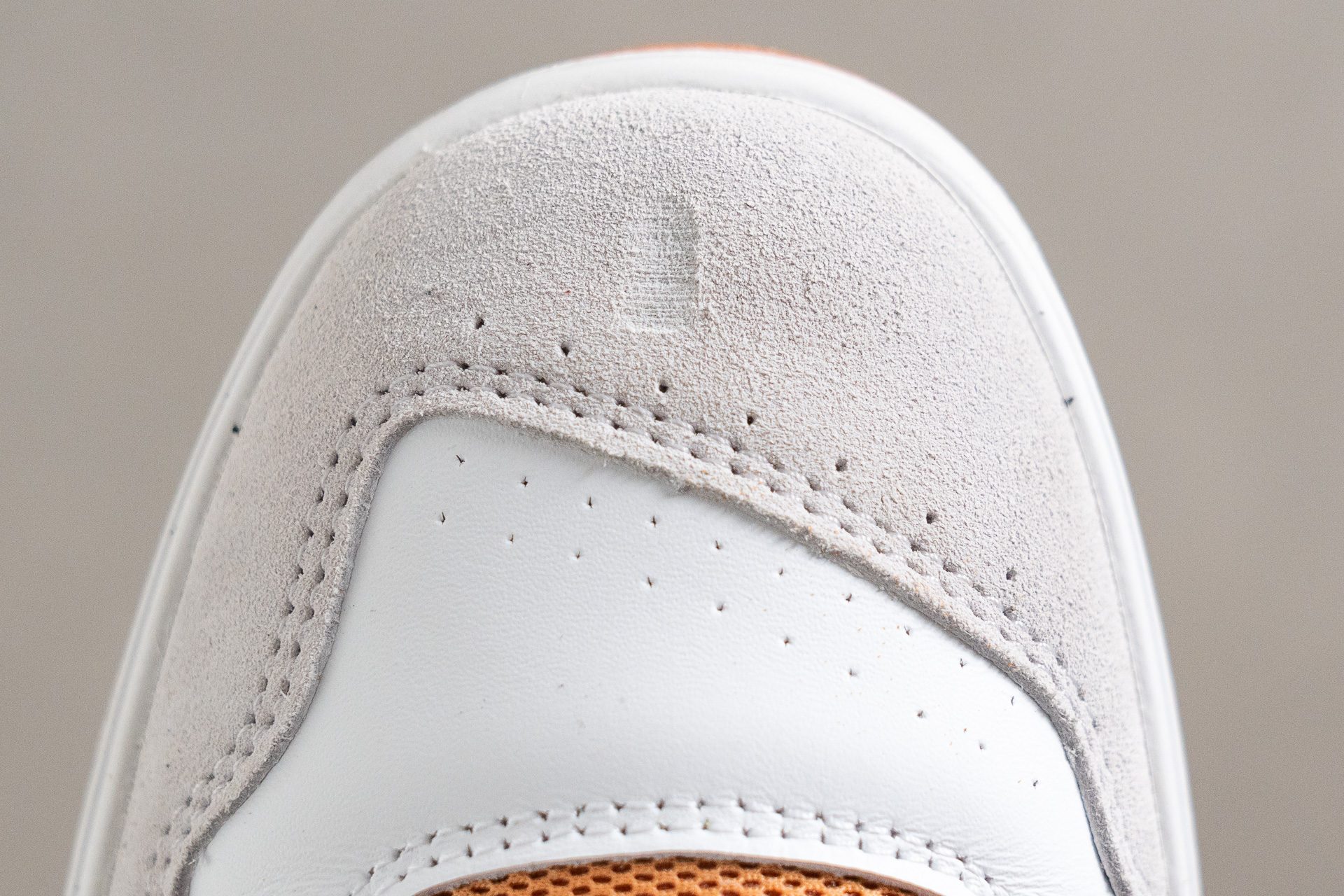
| 550 | 4 |
| Average | 3.7 |
Heel padding durability
We unleashed another four seconds of fury against the 550’s heel counter which also proved to be a worthy contender against our Dremel.
While the tool’s grinding element was able to pierce through the lining material, it didn’t manage to eat away at much of the soft padding within by the four-second mark, therefore leading us to give it another respectable 4 out of 5.
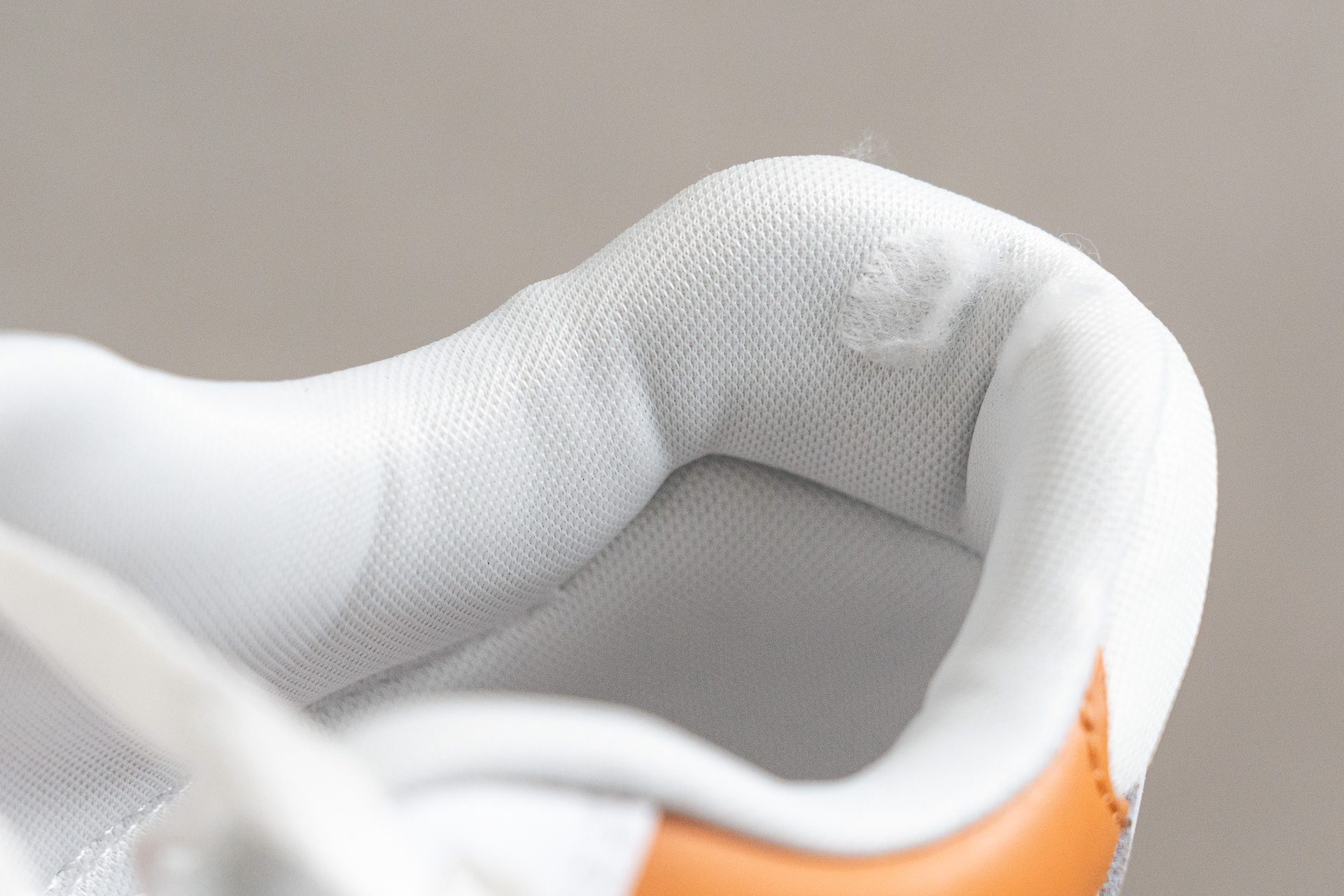
| 550 | 4 |
| Average | 3.2 |
Outsole hardness
With a durometer reading of 85 HC, the 550’s outsole is right on par with our current lab average. Based on our findings in our lab so far, we’ve found that this level of hardness usually denotes a good balance of grip and durability.
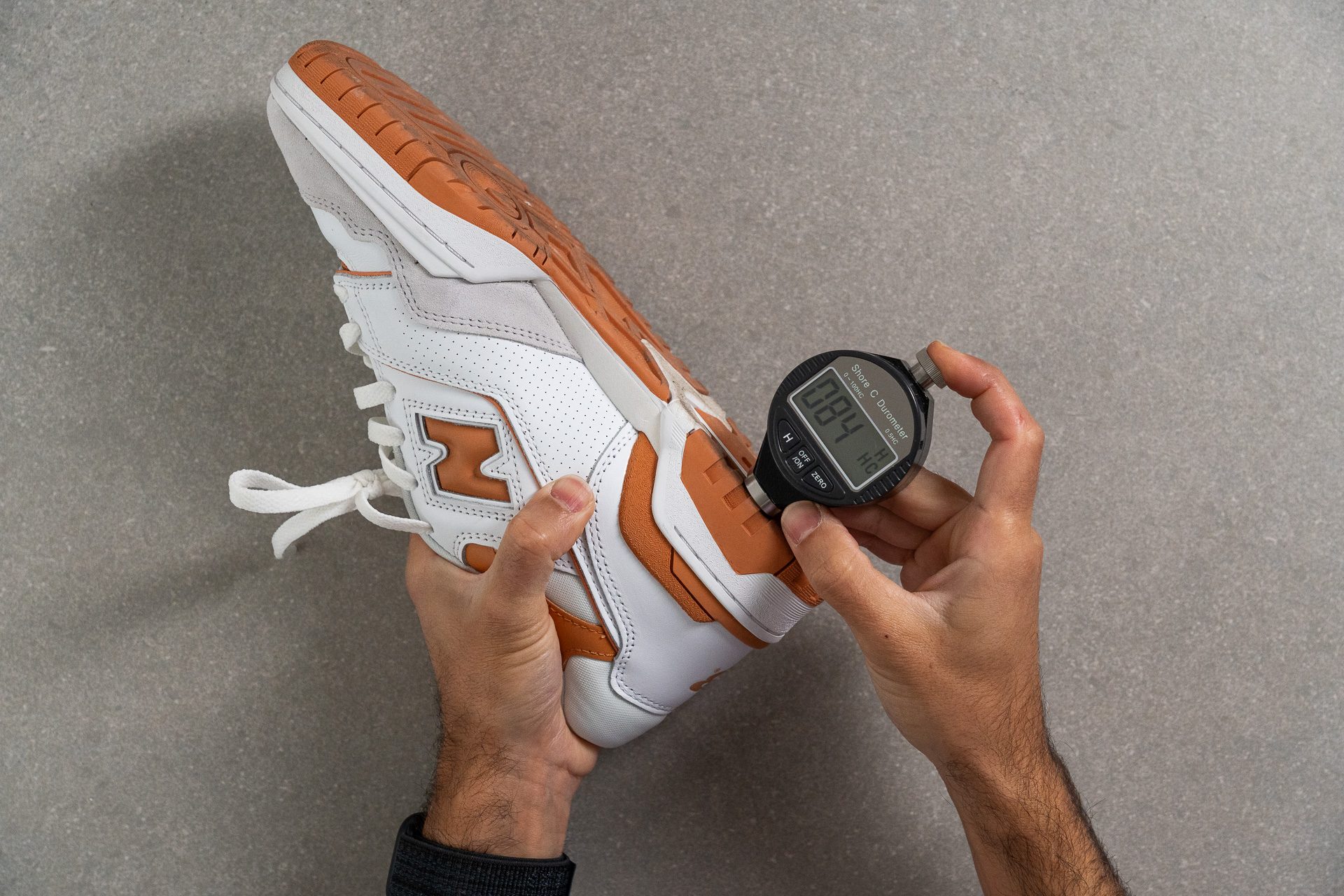
| 550 | 85.0 HC |
| Average | 85.7 HC |
Outsole durability
We turn to our Dremel once more to test the durability of the 550’s outsole. This time spinning at 10K RPM, we pressed the tool’s abrasive element against the shoe where it immediately bit into and eased its way through the outsole rubber.
Once the time was up, we used our tyre tread gauge to determine that the shoe had lost 1.03 mm of rubber from its outsole. This puts the 550 in line with how the average sneaker performs in this test and means that we expect this shoe to last at least 400 miles of use before showing any major signs of wear and tear.
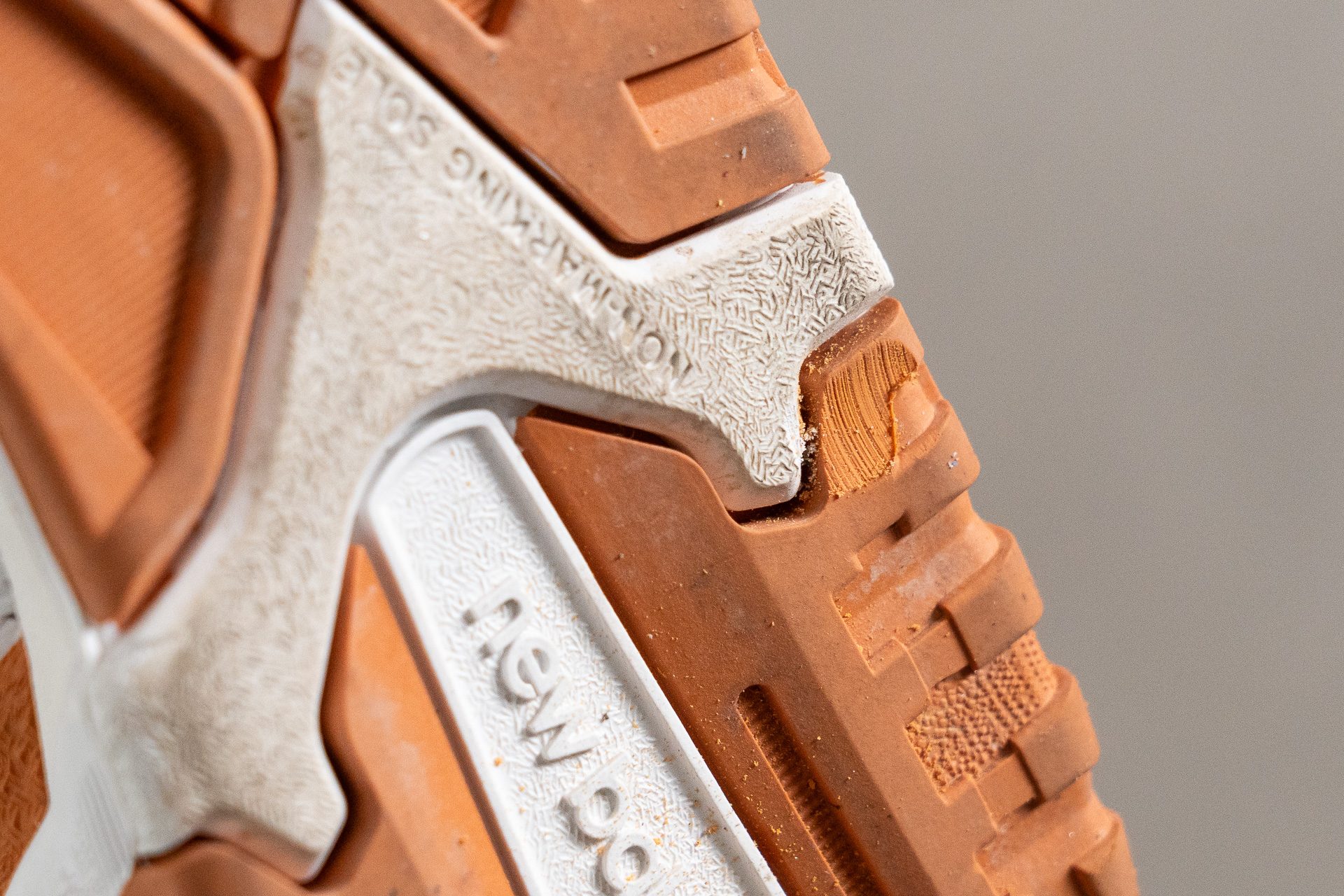
| 550 | 1.0 mm |
| Average | 1.1 mm |
Outsole thickness
At 6.6 mm thick, the 550’s outsole is beefier than average for a sneaker. While all that extra material to wear through gives us added confidence in the 550’s durability, it does affect the shoe’s weight.
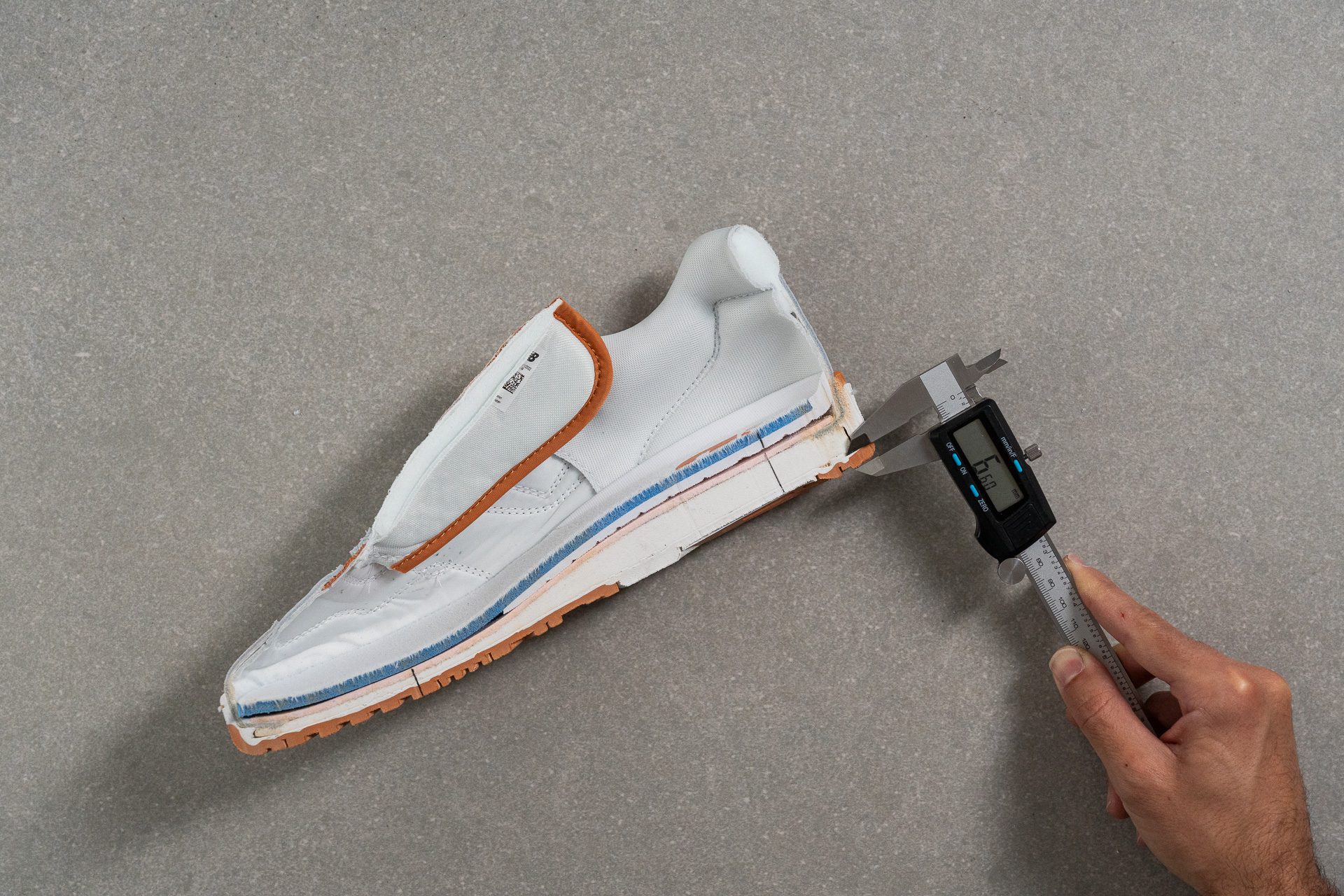
| 550 | 6.6 mm |
| Average | 5.3 mm |
Misc
Insole thickness
At 8.8 mm thick, the 550’s two-layered Ortholite insole is significantly thicker than our current lab average. Not only does this heighten our sense of comfort within the shoe, but it also provides excellent arch support which makes the shoe a great choice for those with flat feet. What’s more, the moisture-wicking properties of the Ortholite insole kept our feet dry and odor-free for hours on end.
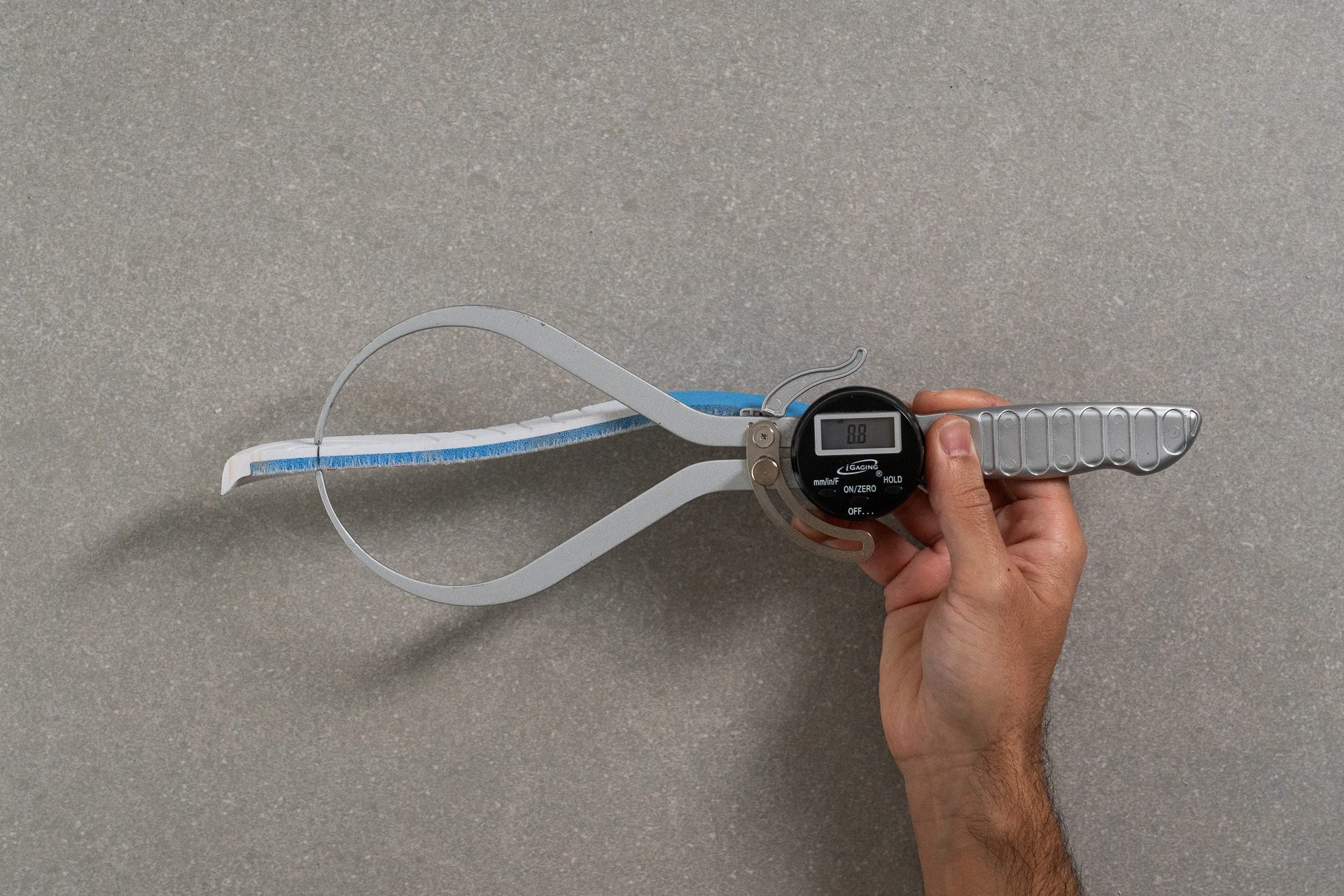
| 550 | 8.8 mm |
| Average | 5.1 mm |
Removable insole
The 550’s insole is fully removable in case the cushy double-layer Ortholite default somehow doesn’t provide enough arch support.
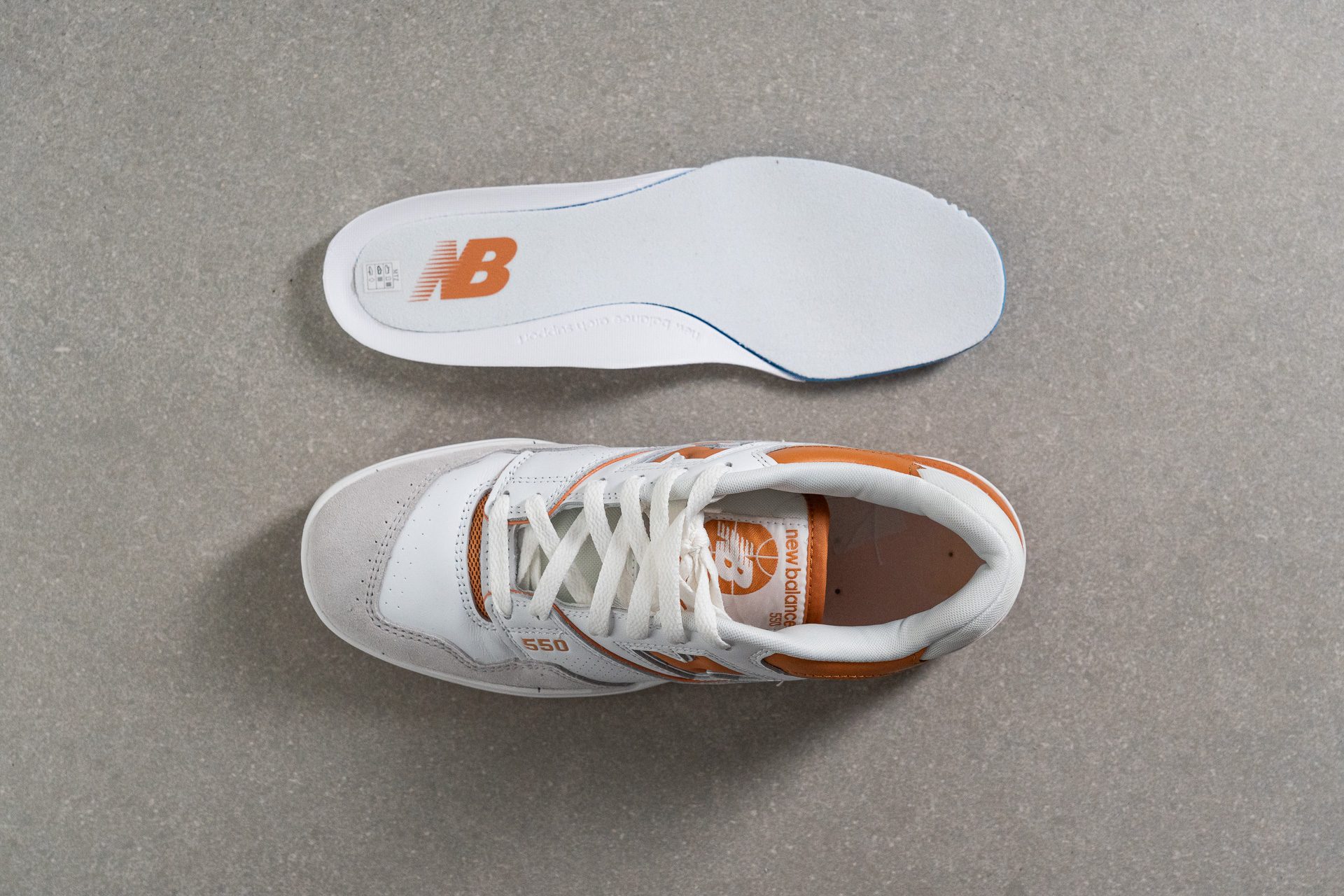
| 550 | Yes |
Tongue padding
The tongue is much chunkier than average, measuring 9.6 mm thick. On the one hm this means that the shoe feels incredibly pillowy and welcoming across the instep. On the other, however, the plush nature of the tongue means that our foot still moves around slightly within the shoe even when laced up tight.
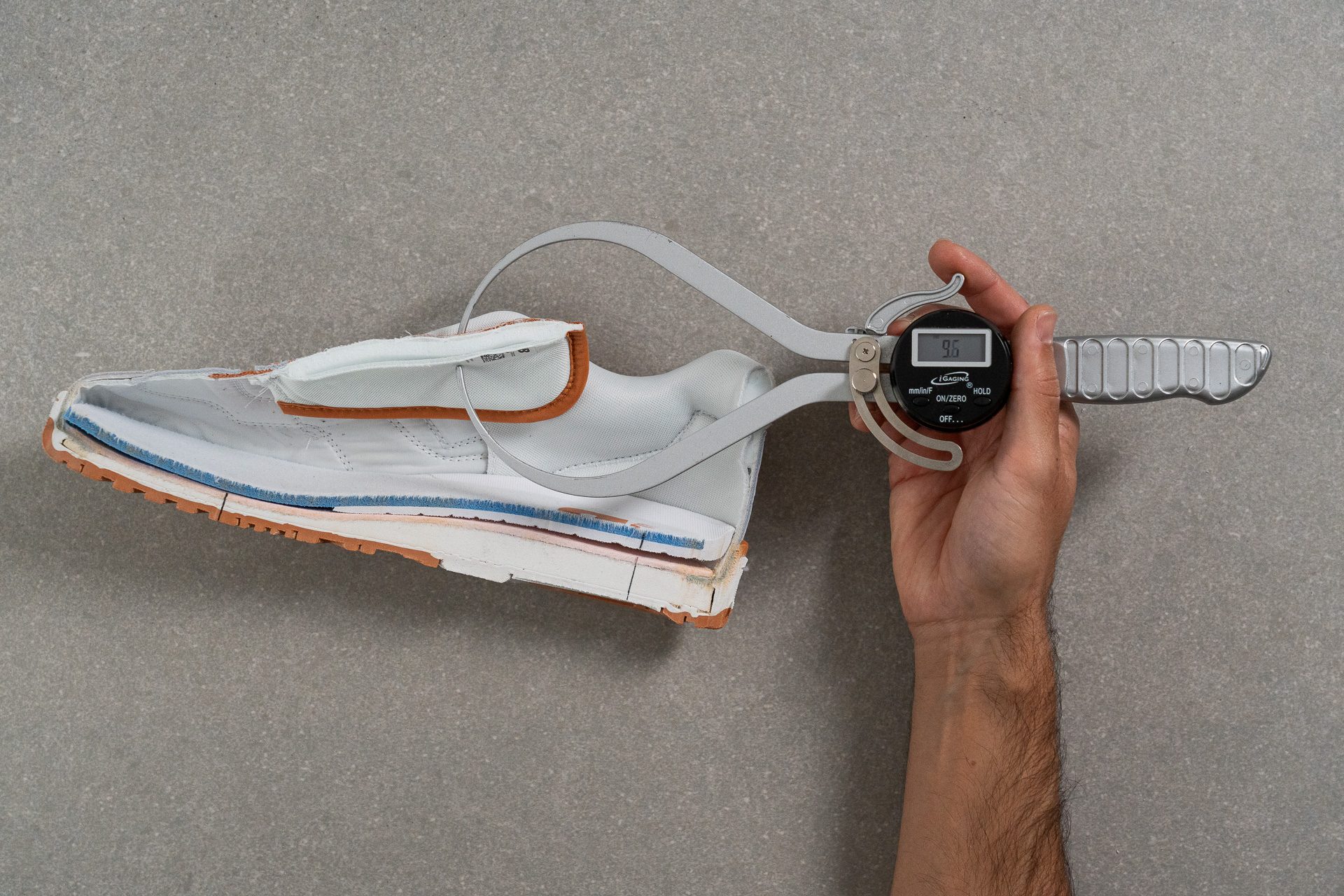
| 550 | 9.6 mm |
| Average | 9.6 mm |
Tongue: gusset type
The 550’s tongue is non-gusseted, though we didn’t experience any issues with it slipping from side to side thanks to the ample padding.
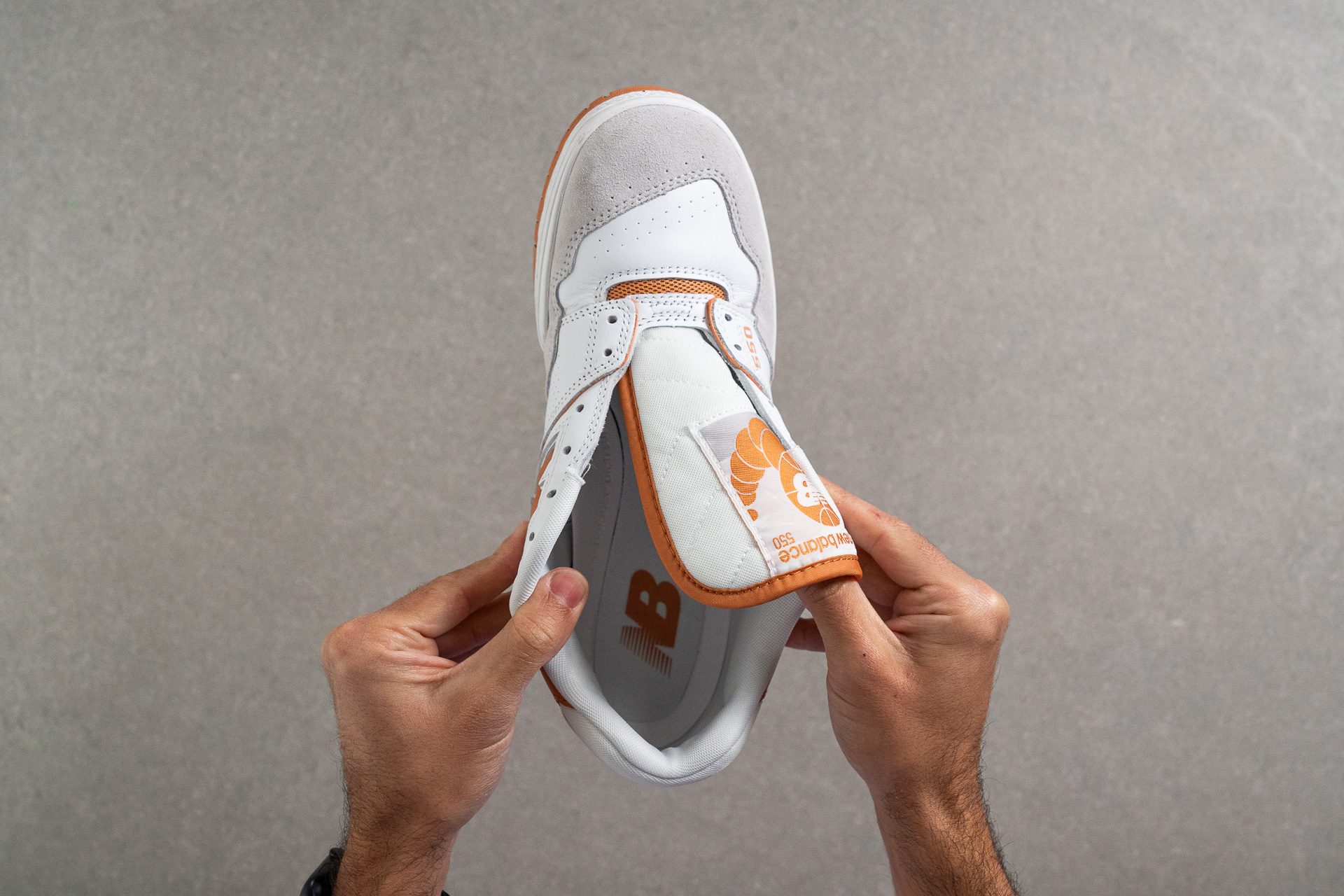
| 550 | None |

